
Shining Hours

COME AND PLAY.
Transcriber’s Note:
The cover image was created by the transcriber and is placed in the public domain.


COME AND PLAY.
That night Edith insisted on taking the old idol to bed with her as of old. Aunt Bell over-heard her talking to it.
“I love you bushels. You are the beautifulest dolly in all the world. And I don’t care if you haven’t dot two arms, and fine clothes, and a parasol. You’ve dot me, and I’ve dot you, and we’ll just do on loving each other. Dat new dolly can sit in the parlor, but you’se my every day chum.”
Edith showed the new dolly to all her friends, but wouldn’t play with it for many days. Like a genuine little woman, she wanted to be loyal to her first love.
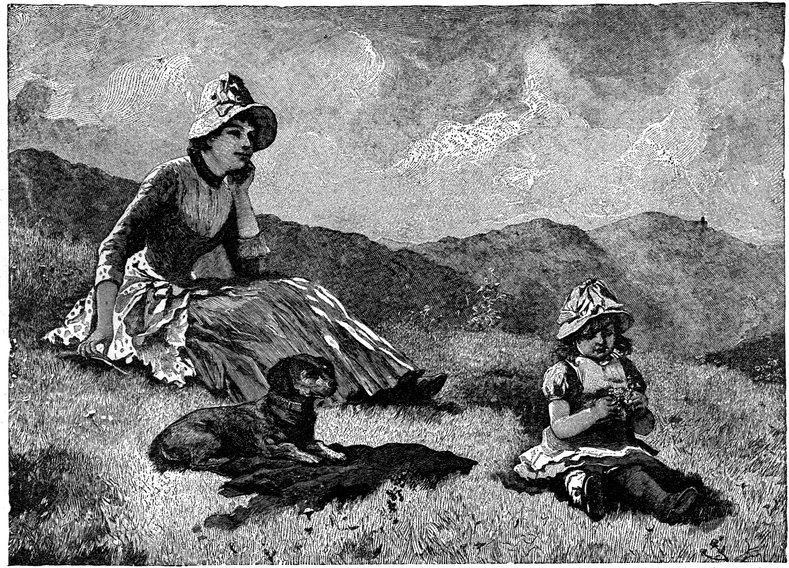

Teheran, the Persian cat, was dozing on a rug in the hall. Suddenly her hair stood on end, and her tail grew large. What-ever was that thing coming down-stairs? She had opened her eyes just in time to see at the head of the long flight of stairs some strange animal, with great eyes and long sharp teeth. To her horror, it slid quickly down stairs, directly toward her.
It did not take her long to run from the mat and dodge the fierce-looking animal. She turned to look, and there lay the four footed beast, just where she had lain. What could he be, and what was he doing in that house? There he lay quietly. Could he be asleep? Pussy-like, she crawled toward him, ready to spring if he stirred. She walked round him with her back up. No, he wasn’t asleep. His eyes were wide open. Was he lying in wait, ready to spring at her?
Round and round him she walked. Not an ear did he raise, not a whisker did he twitch, not an eyelid did he wink. What a curious fellow!
Had he died of heart disease coming down-stairs so fast? Her eyes opened wider. She pricked up her ears to listen. Not a breath could she hear. Poor fellow, he must be dead.
She grew bolder. She played with his paws, and she pulled his tail. She brushed by his side. How queer! No fat, no bones! She put one paw on his back, two paws, three paws, all four paws. How flat! no heart, no stomach, no insides at all. She sat down on him to think. What was he?
Many a day she thought about him; many a time she played with him; many an hour she watched him. But a puzzled cat she always remained.
This little girl has come with her mamma from the noisy city, Paris. She has a shrimping net in her hand, and thinks she can catch shrimps.
The fish-wife is surprised to see a little girl in such fine clothes on the beach. The little girl is curious about the fish-wife. Do you wish to know what they are talking about? Listen!
“Êtes vous de Paris?”
“Oui.”
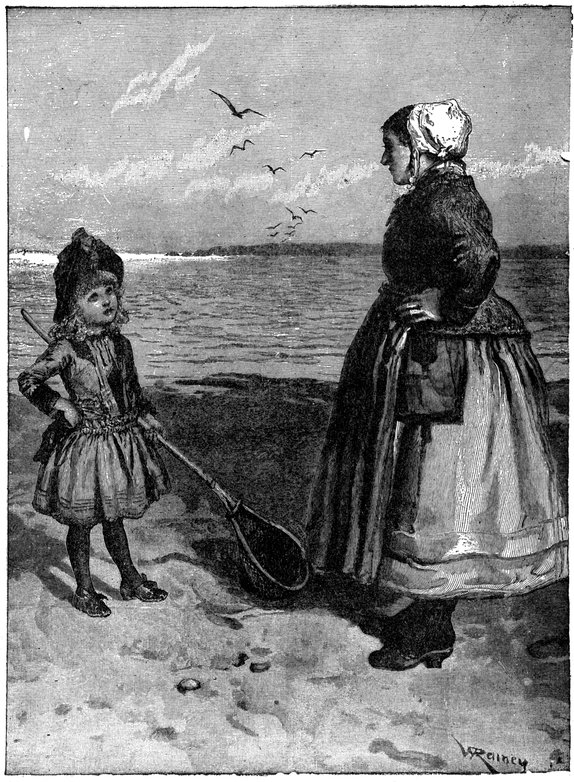
“Combien y a-t-il de temps que vous êtes ici?”
“Il n’y a que trois jours.”
Do you understand? You do if you are studying French. They both talk French although they are dressed so differently. The little girl is very much interested in the funny dress of the fish-wife. The fish-wife is very much pleased with the pretty dress of the little girl. She says under her breath “Qu’elle est jolie!”
They look each other over from top to toe, and talk awhile. Then the fish-wife goes back to her work. The little girl pokes the shrimping-net into the water and tries to catch the shrimps.
Dorothy was wandering about the house, wondering what to do. She strayed into Grandma’s room. On the bureau lay Grandmas’s cap. Dorothy tried it on, and thought she looked very like Grandma. There lay a pair of spectacles. She tried those on too.
Suddenly a scheme came into her wise little head. She went to Grandmas’s closet, found one of her dress skirts, and put on that. Grandma was a short woman, and Dorothy was a pretty big girl for her age, still the skirt was a trifle long in front. Grandma didn’t wear short sleeves and high-necked aprons. Grandma’s black shawl was just the thing to cover them up, Dorothy thought, as she fastened it with Grandma’s big pin.

DOROTHY.
She walked quietly into the hall. Quietly, because she wasn’t sure that Grandma would be pleased. She couldn’t see through the spectacles. She clung to the bannisters, or down the whole flight of stairs she would have gone at one step. Shoving the glasses to the end of her nose, she went on her way. Around the corner lived a poor old lady that Grandma sometimes called on. Dorothy walked to her door and knocked. The old lady came to the door.
“Good morning, Mrs. Johns!” said Dorothy.
“Good morning,” answered Mrs. Johns, looking at her caller curiously. “Come in, wont you, and sit down? I don’t just recall you, though you do seem familiar.”
“My name is Swinton,” said Dorothy. (So it was and so was her Grandmother's).
“Oh, how do you do, Mrs. Swinton? You must excuse me for not knowing you. I’m getting hard o’hearing, and my eyes aren’t as good as they were once. And how are you?”
“I have a little rheumatiz, and sometimes a ‘stick’ in my back,” answered Dorothy.
“Your voice doesn’t sound natural, but perhaps it’s my ears. Does your throat trouble you?”
“Oh no!” said Dorothy, growing nervous. “I guess I better be going.”
“Going! Why you’ve just come.”
But Dorothy hurried away, rather quickly for an old lady.
“Well I never!” muttered Mrs. Johns. “She must be going out of her mind, she acted so queer. The rheumatiz must be in her brain. She walked too fast to have it in her legs.”
Grandma was surprised to see Dorothy coming into the house, dressed in her clothes. She couldn’t help smiling while Dorothy told her all about her call.
“And Grandma,” said Dorothy, “she didn’t find out that I was only myself, and not yourself at all!”
Fido was the proud mother of four puppies. They were born in a clothes basket. While they were very young they did not offer to leave their warm bed. They snuggled close to their mother, and when she went off for a walk they cuddled together.

They soon became venturesome, like most dogs and boys. Two were particularly so. They jumped over-board to go on a tour of inspection, the mother’s sharp eyes following.
The third, not quite so bold, just leaned over the edge of the basket. He leaned too far, and out he tumbled, and then tried to climb back. The fourth was too lazy to move, and kept under cover.
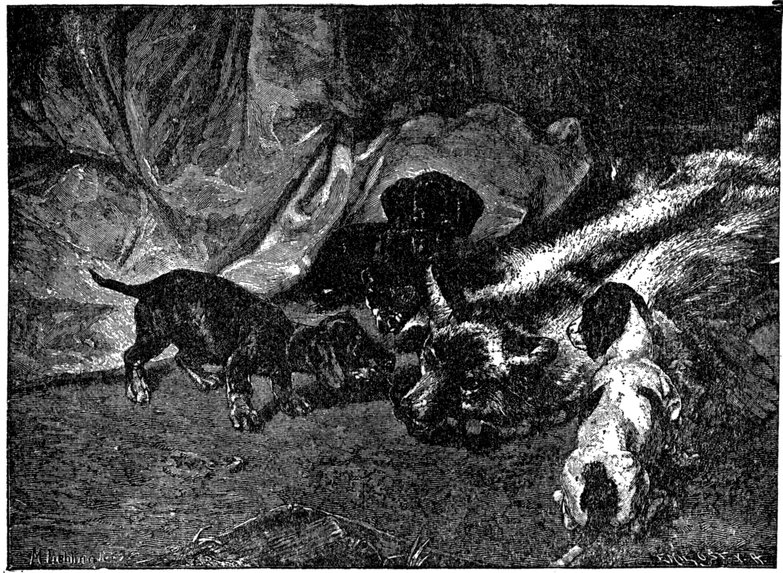
Dear, big, old Colonel eyed curiously these fat, faltering, four-legged new-comers. And the new-comers eyed him. They sat in judgment over his tail as it lay on the ground. They never thought of its being a tail. They only knew one kind, like theirs and their mother’s.
While they were thinking, the Colonel raised this bushy tail. It struck one under the jaw, making him turn a back somersault; it rolled the other puppy over. They were very much surprised, and waddled back to the basket as fast as their weak legs could carry them. The Colonel smiled.
These two dogs grew bolder as they grew older. Once, when their mother was away, they went on another inspecting tour, taking the most timid puppy with them.
They jumped up the front steps of their masters house. Seeing the front door open, they decided to call. They did not know that the proper way was to ring the bell and hand in cards. They simply walked in and found their way to the parlor. What fine curtains to roll on! What beautiful lace to tear! What gay cords and tassels to pull! Such a lark!
That which attracted them most was a mat made of a wolf’s skin and head. At first they were afraid, but seeing he did not injure them, they pulled him about at a great rate. They were having such a good time, they made some noise.
The maid surprised them, and stopped their little game by appearing with a whip. The puppies went out the front door faster than callers usually go; and they never so much as said good-afternoon.
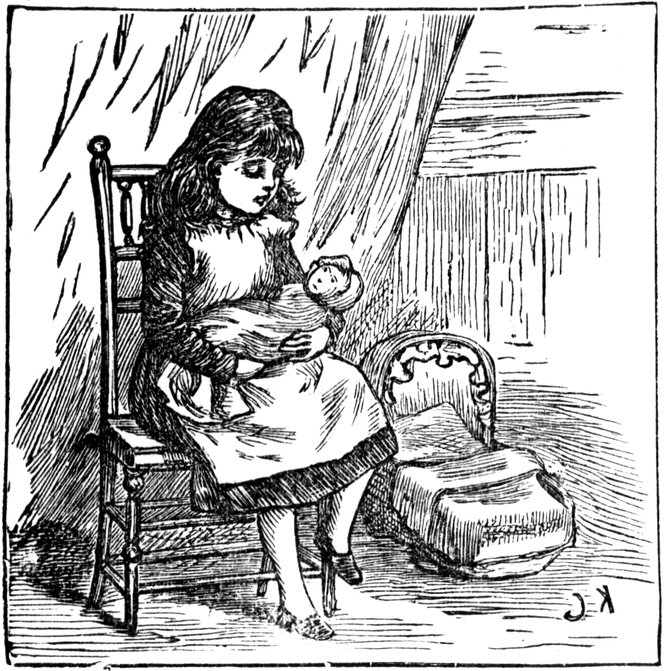
Kate was trying to learn her history lesson. She thought she never could learn the names of all the Presidents of the United States, and recite them in their order. Her eyes would stray to the story books. Her mind would wander to “Lady Constance,” who had her right hand cut off to save the life of her dear husband. And to Cinderella and her lost slipper. And to the Prince who found it and married her. In fact she could think of everything except the Presidents of the United States.
While she was wasting her time, Cousin Anna came in to call.
“What makes you look so cross, Kate?” Cousin Anna asked.
“I can’t get my lesson,” lamented Kate.
“What is your lesson about?” asked the cousin.
“All the Presidents, and I get so mixed up.”
“Have you the list in rhyme?” asked Anna.
“No, Cousin Anna. I never saw it,” said Kate.
“Oh, you must have that. It is so easy to learn. We used to learn the English Sovereigns in rhyme. I remember so well our reciting;
“And so on. And now Mrs. Peter has put our Presidents in rhyme;
“And so forth. Come home with me and I’ll get you her little book. She has the important events of each administration all in rhyme, too. For instance, under Grover Cleveland is:
“Under ‘Benjamin Harrison,’ she has:
“Don’t you think you could learn this?”
“Oh, yes! Cousin Anna,” exclaimed Kate.
Cousin Anna gave the little book to Kate. Kate soon learned the six short verses, and so knew all the Presidents and in their order.
She learned, too, all the events in rhyme.
Theresa loves her cat very much. How do I know? Theresa was hungry. She asked for some milk. She sat down on the floor to enjoy it. Her dog sat down beside her. Frisky, her cat, smelling the milk came and sat in front of her. Frisky did not move her eyes away from Theresa and her milk. She looked and purred, and purred and looked.
Theresa began to feel uncomfortable. She knew Frisky liked milk but so did she. She felt that Frisky was asking for some as well as she knew how. Her eyes seemed to say to Theresa, “I’m very fond of milk and I’d like some of yours very much indeed.” When the milk passed Theresa’s heart on its way to her stomach her heart said, “Frisky wants some too. Poor kittie!”
Theresa put the bowl down and told Frisky to take a taste. Frisky put her little red tongue into the bowl and began tasting the milk. She kept on tasting the milk. She didn’t once lift up her head and offer to let Theresa have the rest. Theresa liked her cat so much she couldn’t bear to pull the bowl away. Frisky’s tongue went fast and so did the milk. Frisky lapped up every drop. She was only a cat and did not know she was selfish.
Some tears came into Theresa’s eyes when she saw that the milk was all gone. She did not scold nor complain. Frisky purred, “Thank you.” Theresa took her in her arms and said, “Nice Frisky!”

Wasn’t this a proof that Theresa loved her cat very much?
“Please cook, let me stir it.”
“Och, no, Miss, you couldn’t,” said cook.
Esther thought she could, but didn’t tease.
A few hours later Esther came into the kitchen again. On the table was the same big bowl. In it was the same stuff that cook stirred. Cook was nowhere to be seen.
In a jiffy Esther was on a chair with the spoon in her hand. “I can stir it,” she said to herself in triumph. It was easy enough. She stirred till she was tired.
She had been back in the sitting-room awhile when the cook appeared in great distress.
“Och, Mrs. Borden, me risins all shpiled; and it wasn’t rats for there’s a shpoon in it.” Mrs. Borden was going to say, who could it be, when she spied Esther’s face. It was very red.
“Esther, child, did you disturb cook’s sponge for her bread?” asked Mrs. Borden.
“Mamma, I didn’t see any sponges and bread,” answered Esther, “but I stirred something in a big bowl. Cook said I couldn’t. I tried, and I could stir it.”
Mrs. Borden convinced Esther that it wasn’t wise to touch anything in the kitchen without cook’s permission.
Esther told cook she was sorry she had made her so much trouble.


Olive was walking in the yard, when she heard a voice calling her to come in. She at once obeyed, and was told that a lady wished to see her in the parlor. This lady spoke to Olive very kindly, asking her if she would like to go to live with her. Olive, liking the lady’s face and manner, said she would.
Olive had lived in this Orphan Asylum several years. She was a very sad-looking child, and no one had wished before to adopt her. This lady wished to make some poor child happy, and chose Olive because she seemed so forlorn. Promising to come for her in a few days, she kissed Olive good-bye.

Martin was Olive’s brother, and lived in the Asylum too. Their mother died when they were very young. Irene, the eldest child, tried to help her father take care of the children and the house, but she was never very well. She grew weaker and weaker. She used to go off by herself to cry. She longed for her mother, and wished she could go to her. Her wish was granted, for she died too.
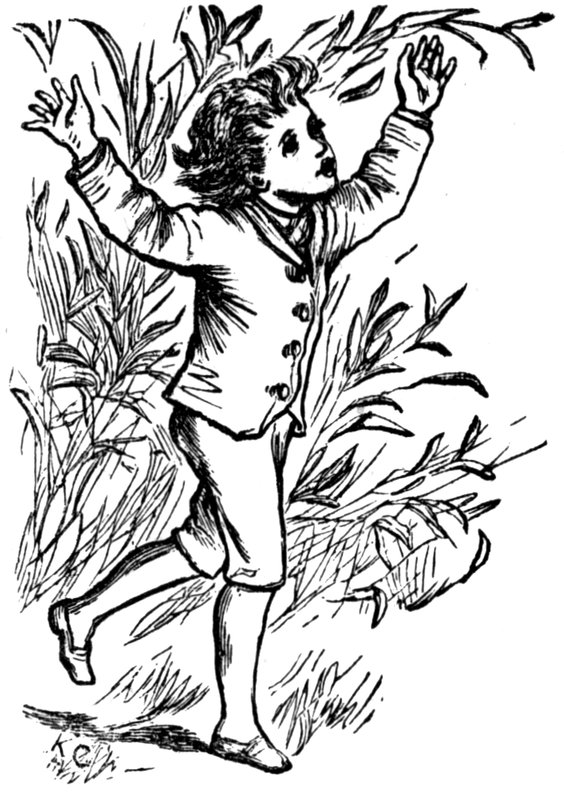
The father couldn’t look after Martin and Olive, so he put them in the Orphan Asylum. It wasn’t very long before the father was taken ill, and had to go to a hospital, where he died. That left Martin and Olive without father or mother, or anybody in the wide world to love them.
When Olive told Martin she was going away with a sweet lady, he threw up his arms and rushed down the garden quite wild-like. Martin was old enough to realize that his little sister was to be taken away from him, and he could never be with her any more. It nearly broke his heart even to think about it.
Olive began to think too. They cried and they thought, they planned and they talked. Olive told the matron she couldn’t leave Martin, but the matron said she must. When the lady came for her, Olive cried very hard, and asked if she please couldn’t take Martin too, for he wouldn’t have any little sister at all if she went away.
Martin came to say good-bye. He and Olive clung to each other. While they sobbed, the matron scolded and the lady pondered. Finally the lady asked the matron’s permission to take Martin for a few days’ visit. That stopped the crying and the scolding, and away the children went in great glee.
Martin was such a quiet, good boy, and so happy to be with them, that the lady and her husband decided to keep both children. Neither they nor the children ever had any reason to regret it.
Olive and Martin had had so little fun in their lives, had shed so many tears, and had known so much about trouble, that they were always grateful for everything done for them, and tried their best to do right. They were very unlike the children, who, while always being indulged and petted, are nevertheless discontented.

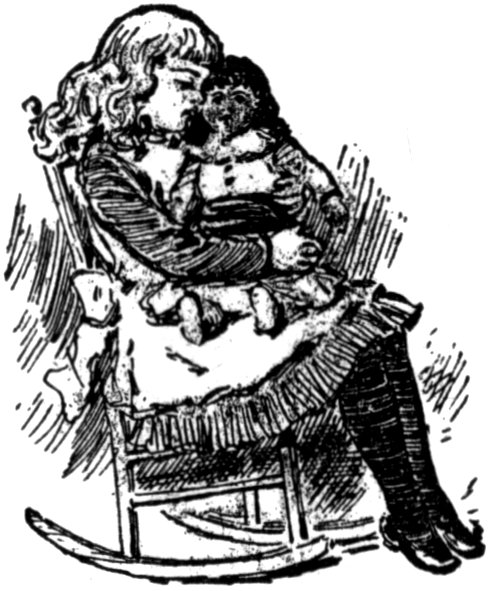

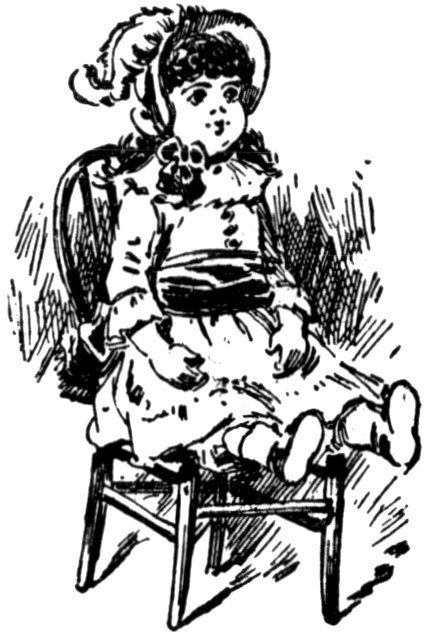
A lean half-starved cur stood curiously regarding a sleek white well-fed pig, cosily curled up in a nest of nice clean straw.
“Some folks get all the good things in this world, I think,” grumbled the cur. “Here is that great fat lazy pig, fed on the best of everything—peas, potatoes, sweet milk, barley-meal, and I know not what all—whilst I am kicked and cuffed, and have to pick up a meal anyhow.”
“Dick!” cried the farmer out of the window. “Be up to-morrow at four o’clock. We’ll kill the white pig for Saturday’s market; and a roast leg of pork won’t come amiss for Sunday’s dinner.”
Next morning the cur was awakened early by strange sounds. “A—h!” said he, as he shivered in his straw, and sat up to listen; “I see now, they only fattened up poor piggy for their own sakes. Seeming good fortune may not be best for us after all. It is better to live poorly in security than to have all we want, and be in constant danger.”
“Dandy, let’s you and me play we’s poor. And we’ve eaten nuffin for free-seven-’leaven days. And we’ll beg our daily bread from door to door, in the rain. Poor little boys have to eat, if it does rain. They don’t have to stay in the house.”
Nibs is a little boy, who is very tired of staying in the house. Dandy is his dog.
“Well have to have a basket to put our daily bread in, and a bumbrell.”
Dandy wags his tail so hard you can scarcely see it. That is his way of saying he’ll back Nibs in any scheme to get out doors.
“Dandy, do you fink poor little boys carry bumbrells? I know one to match poor boys. Big brover said it was so poor its ribs showed. Come on Dandy.”
Here Nibs goes off for a basket and umbrella, Dandy keeping close to his heels. In some way Nibs and Dandy get out of the house unnoticed. After Nibs raises the umbrella, he halts a moment, Dandy waiting beside him. His heart and Dandy’s tail sink at the same moment when a voice is heard calling:
“Nibs, what are you about out there?”
“Dandy and I are just going out for our daily bread,” answers Nibs.
“You’d better come in for your daily bread, or you may get a daily something else.”
“Oh dear!” sighs Nibs. “Dandy, you and I can’t have any fun. We cant even be poor.”

NIBS AND DANDY.
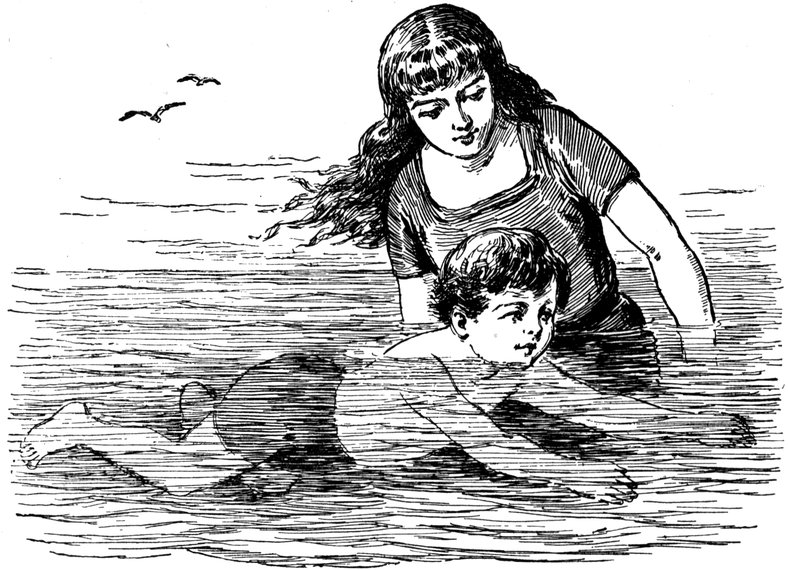
A bath in the sea! How refreshing it is! At first Clarence was afraid, and would scream with all his might, and he is more timid now than he will be when he learns how to swim.
Hazel is not afraid. She does not go far from shore, and enjoys sporting in the cool soft water. Clarence keeps her busy. The water that is shallow for Hazel, is deep for him. He is a small boy.
“Oh! oh! oh!” cries Clarence. “There’s a fish nibbling my toe!”
“Nonsense!” says Hazel. “A kick and a splash will scare them all away. Now I will teach you how to swim.”
“I’m afraid! I’ll drown!” cries Clarence.
“If you’re afraid, you will. But you must learn not to be afraid. Salt water is strong and will hold you up. And besides, I am here to take care of you.”
So Hazel puts her hand under him and Clarence stretches himself, face downward, on top of the water. Then he folds his hands together, and spreads them out again, pushing the water away from him, and using his feet as paddles, and is quite proud of his success. He wants to learn how to swim, so that if he should go out in a boat and be thrown over-board, he could keep his head above water until help came.
When Clarence comes out of the water he must be well rubbed, and oh, how his cheeks will glow! Then he must take a run on the shore.

Come, Bob, Tom, Ned, Jack, Jim—all of you. We are going a-crabbing.
Hooray! hooray! hooray!
Bob and Tom must carry the nets, and here is twine and bait enough for all of us. It is a dull day, and the crabs will bite well, I guess.
What queer shells! Yes. They are periwinkles. Ned will crack them for us when we get to the creek. Then I will show you how to catch crabs. Here we are!
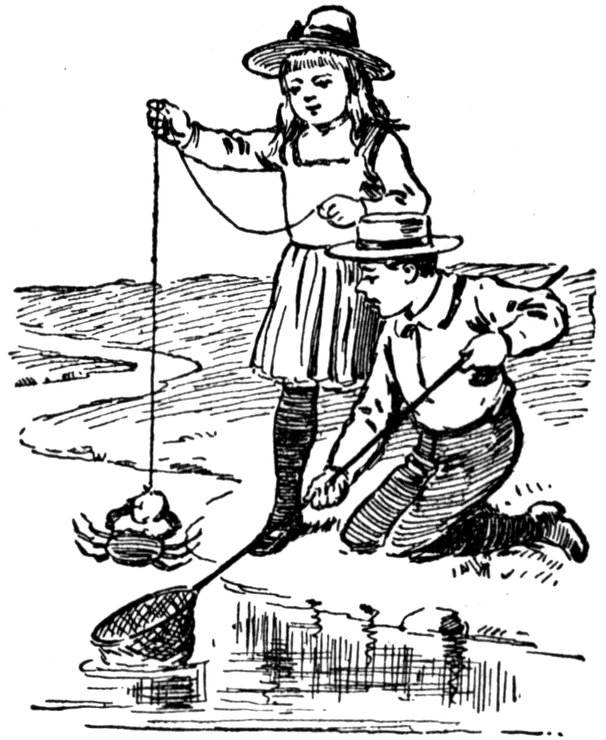
At one end of the fish-line tie on this piece of periwinkle meat. Ugh! It is not nice I know, but you must not be too nice when you go crabbing. The boys must look after the girls and see that their lines are all right. Now—have you plenty of elbow room? Is the bait tied on so that it cannot get off? Then swing the line and throw it so that the bait falls well out into the creek. Now wait—and hold on to the other end of your line. Do you feel a jerk? a pull? Then haul in very slowly, and be ready with the nets, Bob and Tom. Slip the net under the crab as soon as it is near the shore. If you do not it will get away. Look! There is a crab with but one large claw! It broke off the other in trying to get away. A crab will often lose a claw rather than be taken in a net.
See that one dart off under the seaweed! Now we have all that we need. Let us roll up our lines and go home. Look at John, with a crab fast to his coat. Oh! what fun we have had!
Peter is fond of tools. He loves to saw and hammer, and to drive nails. Oh, what a noise he makes! He has a room all to himself in the upper part of the house, and here he spends most of his time on rainy days when he is out of school.
It is handy to have such a boy as Peter around, for if a hinge gets loose, or a piece of board is wanted, there is no need of sending for a carpenter; Peter will attend to it just as well as the best.
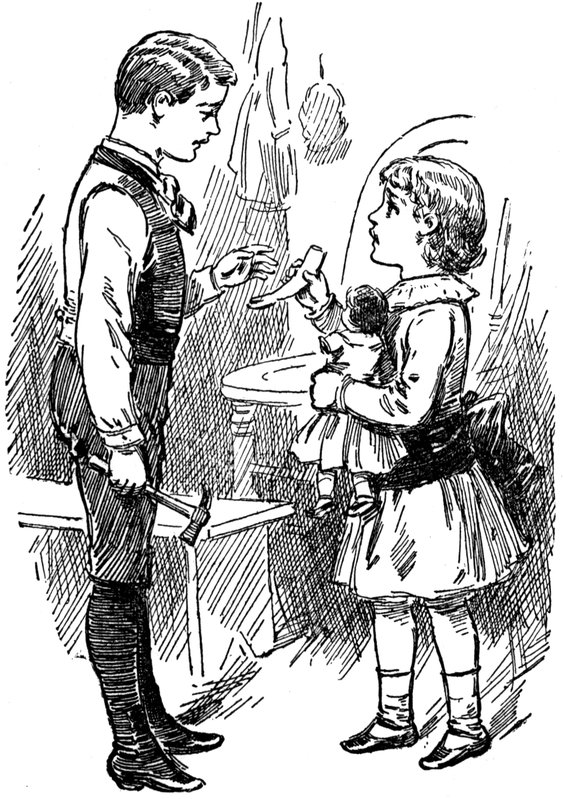
Nellie, Dotty, and Susy, bring him their dolls to mend, and sometimes he has so much work of this sort to do that his work-shop looks like a dolls’ hospital. He has a sign upon the wall—“Dolls mended”—and he tries his best to do his work well, and to keep his tools bright.
Poor little Dotty was almost broken-hearted when Laura Matilda fell and broke her arm; but Jessie said “Peter can mend it;” and Dotty took it to Peter herself for she would not trust the dear doll out of her arms. She has to sit patiently and wait her turn, just as sick people do in the hospital, and is comforted by seeing other dolls worse off than poor Laura Matilda. What if she had broken her neck? or smashed her head? O that is too dreadful to think of.
Peter has an order for a bench, and after he has sawed the board the right length, he will have to use the plane and make it nice and smooth, and all this takes time. Dotty thinks he is very slow; but there are some things that cannot be done fast, and “what is worth doing at all is worth doing well.” Have patience, little Dotty!

Mildred came over to spend an afternoon with Gertie. Gertie led Mildred to her favorite spot. It was out on the rocks, away out to the very last one that could be seen above the water.
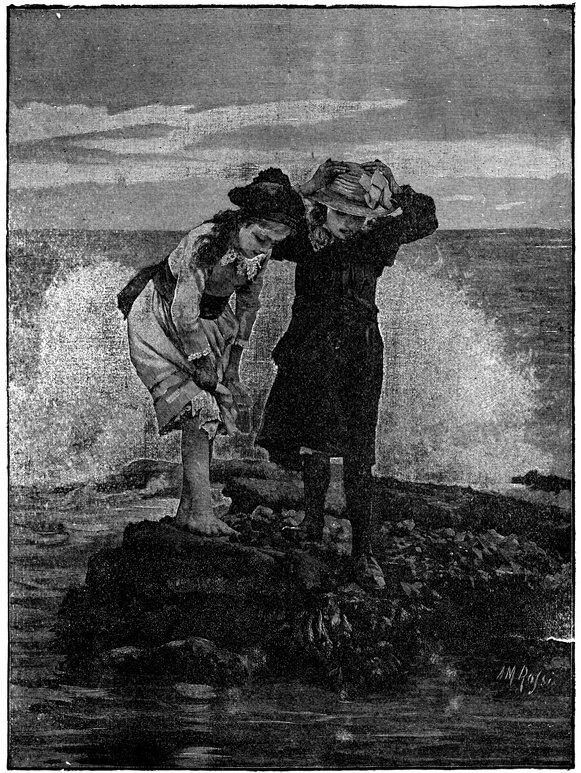
Gertie took off her shoes and stockings. Mildred felt too much dressed up to do that. They sat on the rock, Gertie dangling her feet in the water. They talked, and they laughed, and they sang:
Suddenly Gertie looked toward the shore. The tide was coming in. Already some of the stepping stones were covered with water. Her stockings and shoes were gradually being carried away.
Mildred was frightened. Gertie looked very brave but wasn’t so calm as she looked. She picked up her soaked shoes and stockings. They started for the beach. They ran and they jumped. Mildred wasn’t sure footed. She slipped and she slopped. Her shoes were soon wet.
The water rose higher and higher. No use in jumping, for the rocks and stones were now covered. Poor Mildred had to wade through the water with her new shoes and stockings on her feet. But her shoes were not any wetter than Gertie’s were in her hand. Mildred’s pretty dress was badly wet, too.
Gertie took her visitor to her room to get her clothes dry. She felt ashamed to think she had forgotten about the tide. She was sorry she had by her thoughtlessness marred the pleasure of Mildred’s visit.

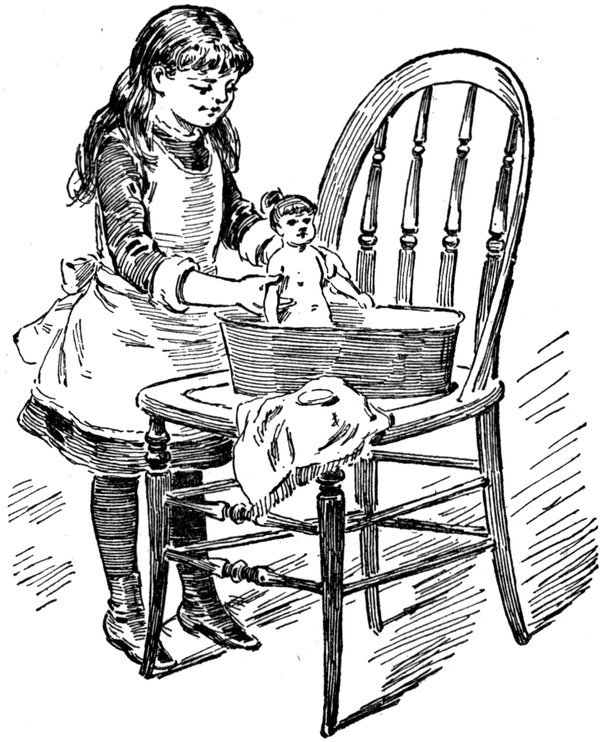
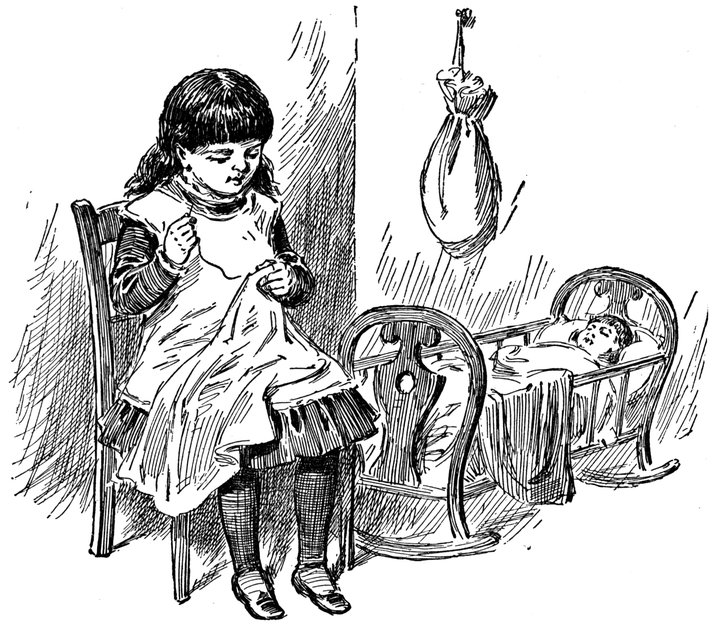
Lulu’s dolls are so large that you would think they were real flesh and blood. She likes to have them large, she says, for then she can hug them, and make it seem as if they were alive. Her doll-baby, Flo, is just the size of her little sister, Baby May, and it is hard sometimes to tell which one she has in her arms.
Lulu is a real little mother girl. She takes the best of care of her dolls, and fondles them, and talks to them just as if they knew all that she said. She makes all their clothes, and keeps them in good order, and it would surprise you to see how well she sews.
She is gentle and kind in all her ways, but sometimes she has to scold G. W. and B. F. and stand them in a corner.
They are such bad boys. Lulu has not made up her mind yet whether she will call them George Washington and Benjamin Franklin, or more fancy names, but has become so used to G. W. and B. F. that it will be quite hard for her to make any change. When night comes on Lulu sings her dolls to sleep, and then puts them in their own little beds where they rest quietly until daylight. If they were real children, and cried out in the night with aches, and pains, and bad dreams, what a hard time Lulu would have!
This is a sad story, as you might well know. But sad things will take place now and then, and we cannot help it. It is a story about a little boy, named Peter. That was to be his name when he grew up, but now nobody called him anything but Pete.
Pete had had a bad fall when a little baby and it left him with a weak back, so that he could not run and romp like the rest of the small boys. He had toys to play with, but they were not nice or new, and he soon tired of them. What he wanted most was a doll. Really? Yes. He was ashamed to let the boys know it for fear they would call him “Sissy,” but deep down in his heart there was a strong desire for a doll to hug, and to hold, and to take to bed with him.
One day a lady came to the house, and somehow she guessed just what kind of a boy Pete was. Without saying a word, she took a small shawl off a hook, gave it a fold and a roll, pinned it together and then handed it over to the small boy.

You should have seen Pete’s face! There was not room on it for the broad smile that tried to get there, and finally had to break itself all up into little bits. Oh, how he hugged and loved that doll! and he soon got so he did not mind being seen on the street with it in his arms. There was no danger of breaking it; and it could sit down bea—u—ti—fully.
One day Pete thought he would try to climb a lamp-post. He had seen the other boys do it, and it looked easy, but he would need two hands. So the doll—Matilda Jane—had to sit down on a stoop near by, and wait until Pete came back for her.
Well, it was not long; but when Pete got back to the place where Matilda Jane was he could not find her.
She was go——o——o——ne! Somebody had stolen her!
Pete was heart-broken. He cried, and cried, and cried. He should never see his own dear Matilda Jane again! And the worst of it was that he wouldn’t know her if he saw her. Even his mother laughed, and said “Oh, it was only an old shawl. No great loss!”
But Pete’s heart was wrapped up in that shawl and that is what makes this a sad story. He might have other dolls, but none that would take the place of his Matilda Jane.
While they dream their mother sits beside them. While she fills their stockings with gifts, her heart is filled with praise. Her two little girls are both alive and well. It is not many weeks since the elder was very ill. The mother had been very sorrowful at the thought of losing one of her own dear girls.
What queer fancies sick people have! This little girl while ill imagined many things. She thought she was a fairy riding in a little golden carriage driven by two small white kittens, and that the doctor was a giant. She told him he was too big to take a drive with her, he would smash her carriage and kill her kittens. If he would be good, and not make her swallow such horrid stuff, she would change him into a dear little Puck, with a green jacket and a lace ruff.
Sometimes she thought she was an angel flying through the air. She said she was sitting on a horn of the moon, but would fly off soon to a world way off out of sight. That made her mother cry.
Once she very politely asked her father—a very large man—to take a seat on the mantle-piece, as she thought the room was crowded. And once she thought she was a clown in a circus, and tried to stand on her head in bed.
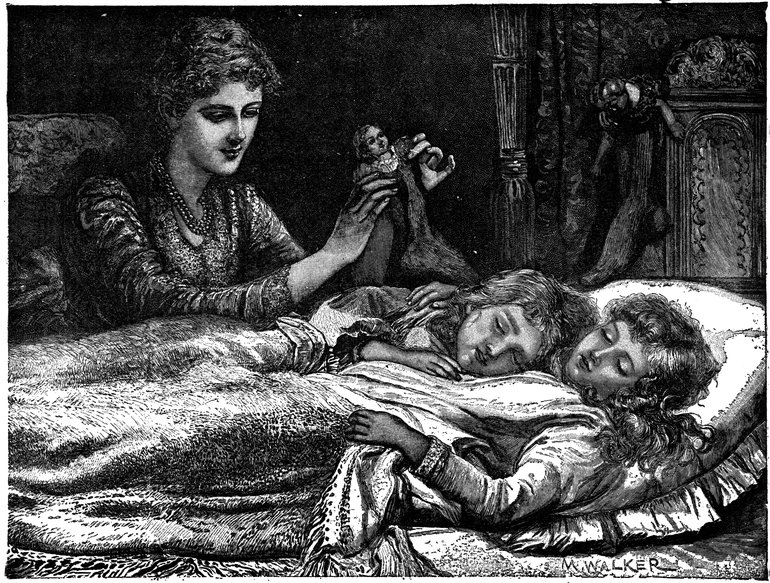
She was very ill; but she got well, however. Now it is Christmas eve. The mother is happy and thankful because there are two little girls instead of one.
Do I look like a happy dog? Do I look like a handsome dog? Do I look like a respectable dog? Is this what the other dogs call fun?
My master is a very kind man. He has brought me up well. I knew he did not like his dogs to stay out all night, nor wander off at any time with vulgar dogs. I had over-heard dogs talking about the fun they had when off together. I had been invited a number of times to join them. I had always refused until last night. Then I made up my mind I was going to have some fun too. So quietly slipping away, I ran around the corner and off with the dogs.
Fun? Yes, we did have fun, though an uneasy sneaky feeling would come over me at times to interfere with my happiness. Fun? Yes, but it ended in a fight! Fun? Yes, we did have fun, but I’m not having any now!
One eye nearly gone, one ear half chewed off, a hole in my cheek, a hump on my leg, my master in sorrow, and I in disgrace, to say nothing of aches and of pains. It will be some time before I get my good looks back again, or my usual fine gait. Three-legged and one-eyed! Ugh!
Fun? Yes! But if any dog imagines that I think it pays, he is very much mistaken. When I let myself down again to go off with vulgar dogs, no matter what the fun, may I be locked in the asylum for foolish and insane dogs!!
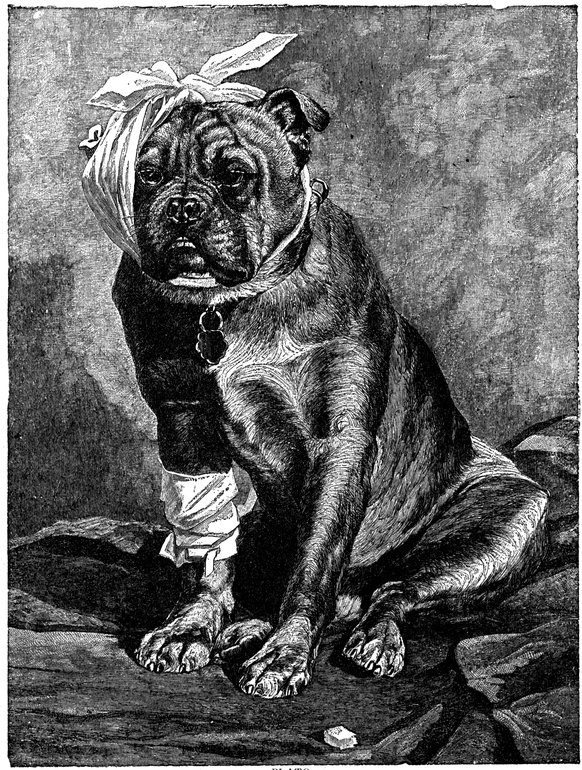
PLATO.
She does not look like a Princess, with her plain fur cap and cape, and driving her own sleigh. Yet a daughter of the King she is.
If you could look under the fur robe, you would find a doll’s carriage, and in it two dolls all dressed for a drive. You would find a doll’s bed, with pillows, blankets, mattress and spread. You would find a pair of skates, a sled, some mittens, handkerchiefs, caps, and hoods; and a basket of candles, spangles, and small toys for a tree.
This “King’s Daughter” did not pay for them all. She is only one of a circle of Daughters. They saved their money, they bought the toys, they made the clothes, and they dressed the dolls, not for themselves, not for their own little brothers and sisters, but for a family of children who but for them would have no presents at all. Their father is poor and ill, and their mother earns but little.
It is the day before Christmas. This King’s Daughter is taking these things to the home of those poor children. The other Daughters will meet her there, to trim a tree they have ordered. The poor mother will help them, forgetting her sorrows for a while. The sick father will smile as he looks on. This will be his last Christmas-tree on earth, as he can not live much longer. He is very glad the King has sent his daughters to do for the children what he is not able to do for them himself.
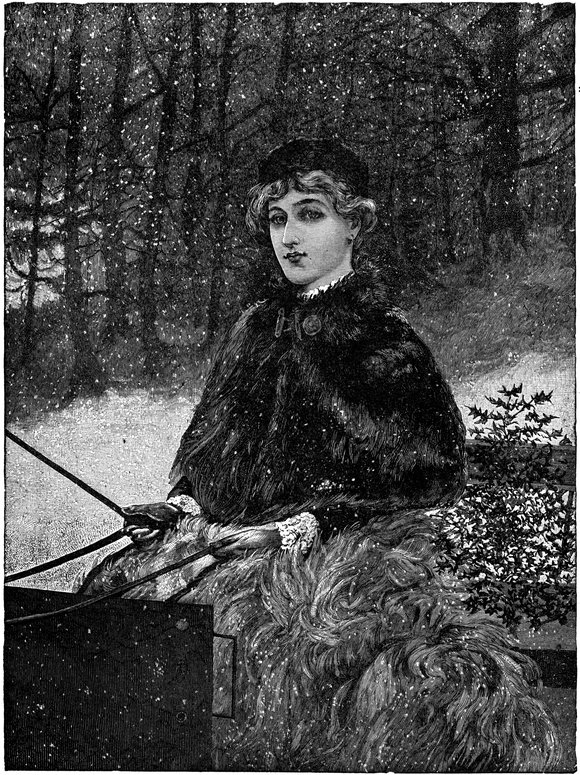
On Christmas day will come a basket, full of good things to eat, which these same girls have provided. These girls by saving their money have had less candy to eat, fewer trinkets to wear, and perhaps a little less fun. But think of the comfort and happiness they will give to those poor children, that sad mother, that sick father!
Are you a daughter of the King?
Allan thought it was time he learned to get himself ready for bed. He wished to be a man as soon as possible. That, he thought, would be one way to grow manly. So he kissed everybody good-night and went upstairs to bed all alone.
No, not exactly alone, for Toodles went with him. Allan did not admit it to anybody, but he really was very much obliged to Toodles, as he was a great deal of company.
“Now Toodles, you watch me undress, and see if I don’t know how!” And Toodles watched.
“You see that, Toodles?” asked Allan as he put out one foot with a stocking on it. “That is where I keep some of my pigs.”
“Pur-r-r, pur-r-r,” said Toodles.
“Sure!” said Allan. “You can’t see them, for they are all covered up; but they are there. Now, look!” Allan jerked off the stocking and wiggled his toes before Toodles’ very nose. “See, five of them!”
“Pur-r-r, pur-r-r,” said Toodles.
“And here’s where I keep all the others!” said Allan as he held up the other stockinged foot. “See them?” Off went that stocking. “Are they not nice little pigs? There’s the one that went to market, and there’s the one that said, ‘squeak, squeak.’” Allan poked his bare foot into Toodles’ ribs and wiggled his toes in his fur.
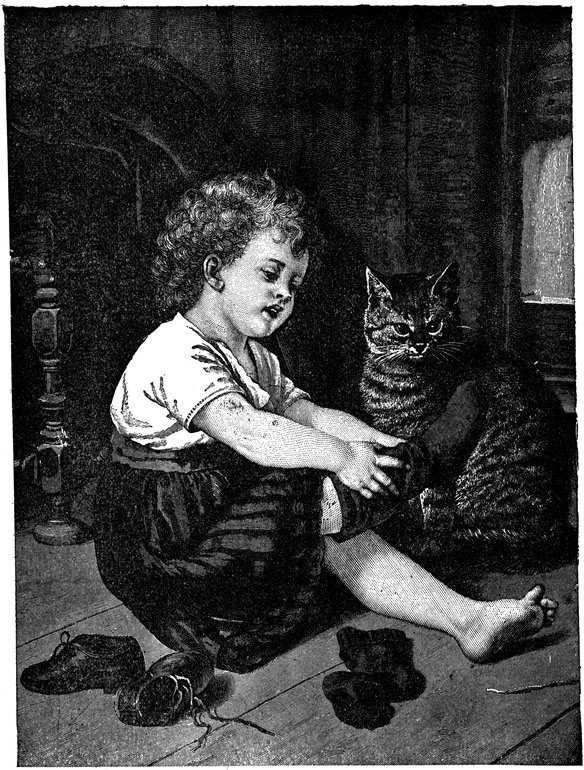
“Pur-r-r, pur-r-r,” said Toodles.
Allan got his clothes off, but found it hard to get his nightgown on. His hands would go into the legs of the gown. His feet would go into the arms of the gown. He and the gown got all tangled up. Toodles couldn’t help him. He could only encourage him by saying “Pur-r-r, pur-r-r.”
Mamma came up and straightened him out, and buttoned his gown behind.
Then Allan said his prayers, asking God to “bless everybody and Toodles.”
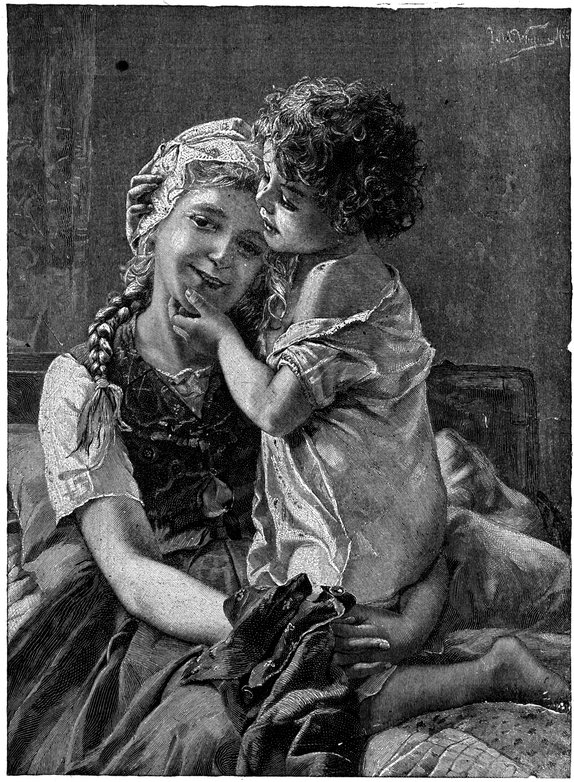
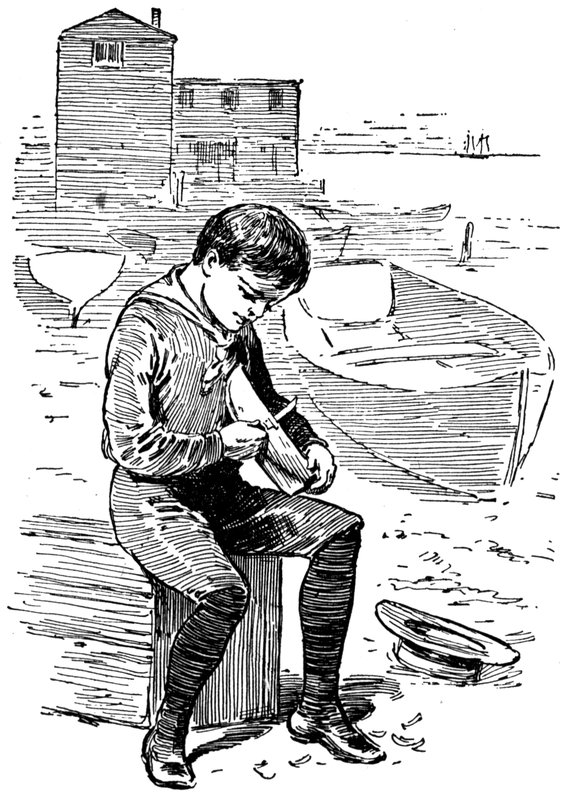
James had a present of a big Jack-knife, and oh, how proud he was of it! He whistled all day long, and at last made himself a nice boat, with bowsprit, mast, and sail, all complete. James called his boat the “Arrow,” for it would fly so swiftly when the wind was right. O how it would go!
James had a sister Ella, near his own age, who was very fond of her brother, and proud of the boat that he had made. The two always played nicely together, and were never known to quarrel. James liked to please Ella, and Ella liked to please James, so both were happy.
There was nothing James and Ella enjoyed more than wading in the shallow water and guiding the little sail-boat—their newest toy. Ella called James—“Captain”; and James called Ella—“Mate,” and as James wore a sailor-suit he felt quite like a sea-faring man.
James was careful not to let his little boat get out into deep water, for it had cost him a great deal of time and trouble to make it, and he did not care to lose it. But one calm day the Captain and Mate had gone for a drive, leaving the sail-boat in what they thought was a safe place. While they were gone, a stiff breeze came up and blew the little boat away from the shore, and it sailed, and sailed far out of sight. Wasn’t that too bad?
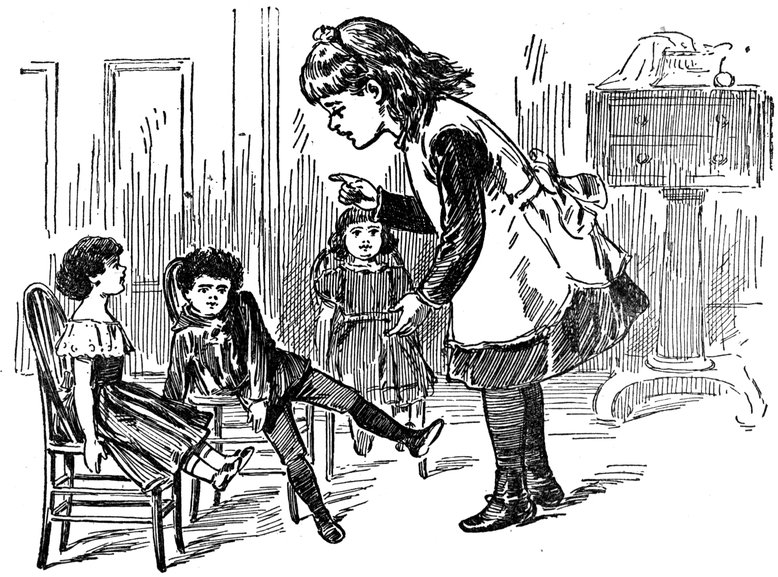
I have three dolls. Their names are Blanche Amelia, Capitola, and John Henry. Blanche Amelia and Capitola are very well-behaved, but John Henry gives me a world of trouble. I thought it would be nice to have a boy-doll. But it is not. He is a great care.
When I dress up Blanche Amelia and Capitola in their best clothes, they seem to know that they must act like ladies, and I am never ashamed of them.
I love to make believe; don’t you?
Mamma and my sister Belle go out to afternoon teas and receptions, and when they come home I hear them tell how this one looked, and what that one did, and what the other one said, and what they all wore, and oh! how I do enjoy it.
Then I have an afternoon tea for my dolls. I have my own set of dishes, and my own tea-tray, and I pass the cups around to them just as if they were real folks.
Blanche Amelia and Capitola sit up and behave their best, but John Henry will put his arms on the table, although I have told him it is not nice to do so.
When I play afternoon tea I have to eat all the goodies myself, and drink all the warm milk, which I call tea, and when the play is over I am ever so tired. But not a bit hungry. Oh, no!
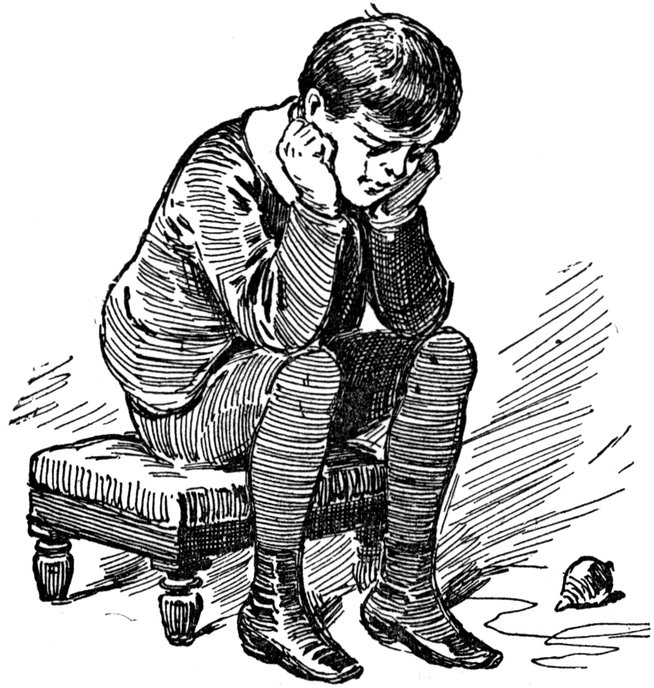
“I just wish I could be let alone for a while,” said Elmer Green. “I am tired, and I don’t want to do anything for any body.”
“Tired” was another name for “cross,” and to tell you the truth this was one of Elmer’s real cross days. He got up cross, and he would stay cross for some time. He always did. It was of no use to try to please him. It could not be done. So he took a book and went off by himself, but was not gone long before he came back for his top. He spun that for a while; then he got out his toys; then he counted his marbles; then he thought he would pick some cherries, but there was no one to go with him, and there was no fun in going alone.
What should he do? He wanted to be amused, and didn’t know how to amuse himself.
Presently he came into the room where his mother was, and stood around hoping she would ask him to do something for her. But she did not. She had a great deal to do, and needed help, but she would not call on Elmer. It made him feel as if he was of no use to any one.
“Mother,” he said at last, “what can I do?”
“Please yourself,” was the quick reply.
That was what Elmer had been trying to do, but with poor success. He hung his head, and felt as cross as a bear. As he sat in a corner, his mother took up the pail to go out to the well. Elmer seized the pail out of her hand and drew the water. He began to feel better. Then he looked around to see what else he could do. He did not wait to be asked. The more he did, the more he felt like doing. He had found out that it was not nice to be let alone; and he also found out that he pleased himself most by trying to please others.
Come, let us sit down under the shade of this big tree.
How its branches reach over, and dip down into the water. It is like a great umbrella. It is an old tree. See how thick the trunk is. It is nice to sit in its shade on such a warm day. We will ask the miller to give us some corn, and we will feed the ducks. There are five of them—white as snow, and with bright yellow bills and legs.
Here they come!—one, two, three, four, five. Let us name them. Ala, Ela, Ila, Ola, Ula. The names sound very much alike, but that will make no difference to them. And if you call one the others are sure to follow.
Quack—quack—quack—quack—quack!
They know what we are sitting here for, and they are in haste to be fed. They are always hungry.
Now throw the corn out, where the water is deep. See the ducks dive for it! That one is standing on its head. How queer it looks, with its yellow legs kicking up on top of the water. Over goes that one! Heels over head! The ducks don’t mind. Now let them quack, quack for a while. Soon they will sail off to their pet feeding-ground, where the earth is moist and there are soft grasses.

Look! look! What is the matter? A big turtle has seized one of the ducks by the leg. It cannot get away. Isn’t that too bad! Now there are only four white ducks on the mill-pond.
One afternoon Mrs. Bruin was obliged to leave her cubs alone. She cautioned them not to go far from their cave while she was away.
They had their usual play together, rolling and tumbling and chasing each other. They ran farther and farther away from the cave, as no mother was there to call them back. They ran around trees and scrambled over logs; they climbed over rocks and stepped into bogs. Growing tired, they turned to go to their cave to rest.
Where was it?
They looked into one cave. That was not theirs. They looked into another cave. That was not theirs. They poked their noses into hollow trees, they sniffed around between the rocks. Had their cave moved away! Oh! where were they! No home! No mother!
Oh dear! Frightened nearly to death, these young cubs took to their heels. They did not know which way to go, but they ran. Splash! Splash! Into a stream that he didn’t see, tumbled one little cub. Such a howling as was set up, by the other little cub. And the howling was not in vain. It had a very familiar tone to Mrs. Bruin, who was walking home that way.
She hurried to the spot from which it came. She saw at once the plight of the cubs, and that they were her very own babies. She made a dash for the little one struggling in the water and pulled him out by the nape of the neck. Mrs. Bruin shook him pretty hard, perhaps to shake off the water, and perhaps to punish him a little. She was very much surprised to find them in this part of the woods all alone by themselves. She marched them off to their home. The walk was an instructive but not a jolly one.

Box and Cox were twins. Griswold, their little master, was very fond of them. The dogs and the boy were always together.
Griswold let them play with some of his toys, but not with any they could hurt. Somebody gave Griswold a new toy-rabbit which he kept safely away from the dogs, except once. Then he left it on the floor while he went out to see a boy passing by.
Box examined the bunny, nosing and pawing it all over. Cox tried to get his nose or a paw on it, but Box kept him off. Suddenly, while Box was looking up, Cox grabbed bunny by the back and started to run. Box as soon as he could collect his wits ran too. Such a race! Over the toys, down the steps, out in the yard, around the house, they chased and they raced.
Cox held the bunny fast in his mouth, and kept the lead for a long time. Box finally got near enough to catch the bunny’s head in his mouth. Then came the tug of war. Cox pulled one way, Box the other. Cox tried to shake Box off, Box tried to shake Cox off. Cox growled, Box growled.
Griswold, coming back to his playthings, missed the dogs and the bunny, and feared something was wrong. Hearing some growls, he went to look for the dogs. His heart came into his mouth as he saw them jerking his bunny with all their might.
He got to them just in time to see poor bunny come apart. And he came apart so suddenly that Box, with the head in his mouth, keeled over one way, and Cox, still holding the back, keeled over the other way. This ending surprised them. Each dog sat down to think and to pant.
Griswold sat down to think and to cry. Griswold’s mother came to the rescue. She gathered up the remains of the rabbit, whipped Box and Cox, and consoled Griswold. She said the bunny’s head could be plastered on; but his expression would never be quite the same, for one eye was knocked in, and one ear was gone.
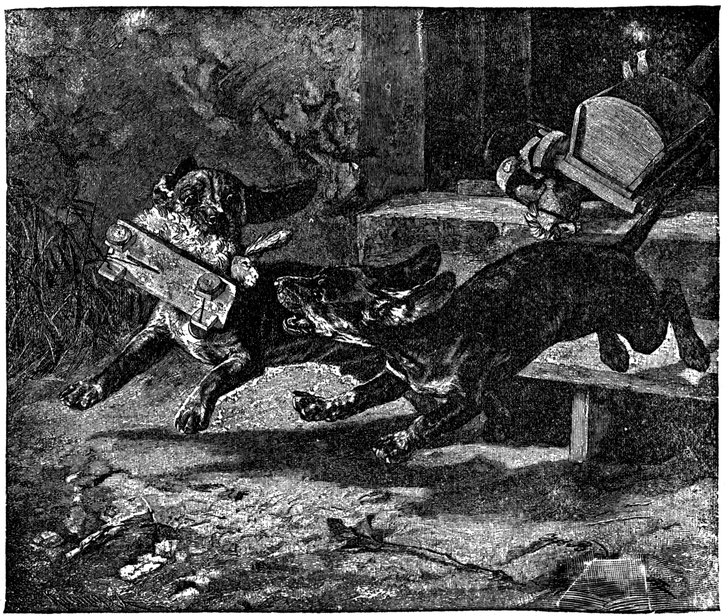
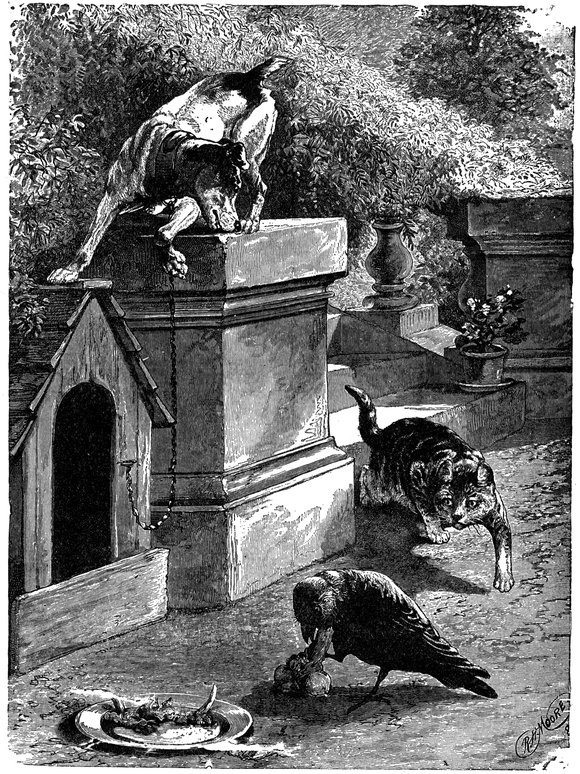
Tiger, Towzer, and Tip, although the pets of one household, were often jealous of one another.
Towzer and Tip were sometimes friendly from sympathy. Towzer was chained up and couldn’t run away, Tip had had his wings clipped and couldn’t fly away, while Tiger, the sly cat, was free to go his way.
Tiger took his after-dinner nap on top of the large square post near his kennel. One day, while he was resting up there, Tip examined the bones on his dinner plate. Tiger, lying on the steps, saw Tip picking the bones. He loved to tease Tip by springing at him, and Towzer loved to tease Tiger. Towzer thought he saw a chance for some fun.
Tip fastened his eyes on the bone; Tiger fastened his eyes on Tip; and Towzer fastened his eyes on Tiger. Tip picked the bone; Tiger tip-toed over the ground; Towzer wagged his stub of a tail.
“Caw-caw, meow-ow, bow-wow!” What a row! Towzer, Tiger and Tip all in a heap, clawing, scratching, and tumbling one over the other.
“Caw-caw, meow-ow, bow-wow!” What a row! Feathers and fur! Claws and paws!
“Sis-cat!” said a voice.
And they “scatted.” There sat Towzer in front of his kennel, looking as though nothing had happened. Tiger and Tip were nowhere to be seen. By the contented wag of his stub of a tail, Towzer showed he had had some fun. He winked and he blinked as he glanced at some fur and a feather or two at his feet.
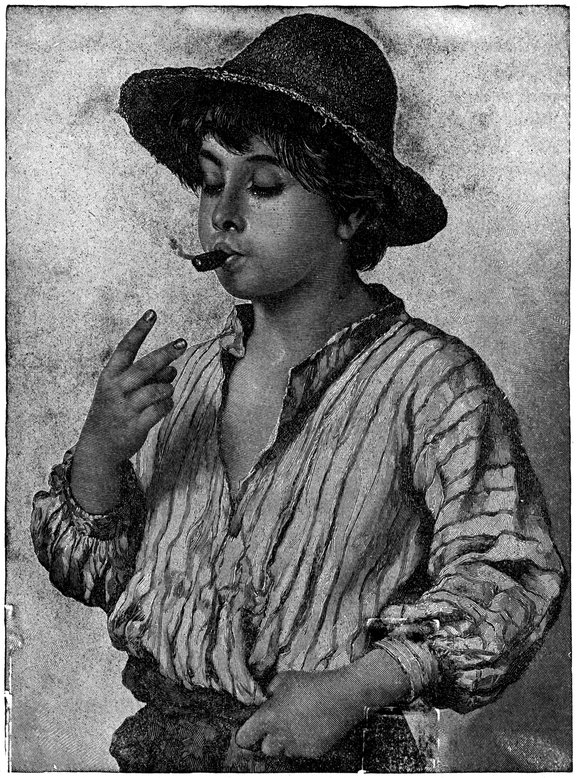
“Please, mister, give me a cigar!”
The request was made by Tolomeo, but was not granted by the person addressed. Tolomeo had seen men smoking. They seemed to enjoy it. He wished to smoke too. His income as a news-boy was not large enough to buy cigars, so he had never smoked.
While he was wishing for a cigar, he saw a man throw away the one he was smoking. It was quite a large piece, and Tolomeo ran for it. He felt very grand as he thrust one thumb into his trousers and held the cigar just as he had seen men hold theirs. He drew the smoke into his mouth, then let it out, trying to form little rings. He did not know how, exactly, but he tried to learn, feeling like a big man.
His attention was presently called from his smoking to a queer feeling in his mouth and stomach. There was trouble all along the line between the two, and Tolomeo was miserable. The stump of the cigar was forgotten. He only knew about his dreadful feelings.
“Hello, old fellow, what’s the matter?” A voice in his ears and a thump on his back, showed the presence of a friend.
“I’m sick!”
“Seems to me I smell smoke. I say Tolomeo have you been making a chimney of yourself?”
Tolomeo did not answer.
“That’s what’s the matter; you’ve been smoking.”
“I guess smoking don’t make fellows sick.”
“Don’t it though. Tried it before?”
“I can’t say, I have.”
“Ha-ha, ha-ha” laughed the friend.
“Keep quiet will you. Men wouldn’t smoke if it made them feel as I do.”
“Don’t you make a mistake. Most of them have just such a time at first.”
Tolomeo was amazed. He wondered how anybody could get enough fun out of smoking to pay for such bad feelings. He didn’t try again although he was told if he smoked often enough he would feel all right. “What’s the use any way?” he said. “If I grew to like smoking, I’d buy cigars and have less money for clothes than I have now. Besides I want to save enough to go to the ball-game. I want my money for lots of things more fun than smoking.”

They were arranging the holly to trim the parlors for Christmas.
“Mamma, may I put a big bunch over Floy’s picture?” asked Eloise.
“Certainly, my dear, I was just thinking about it myself.”
The mother’s eyes filled with tears as she spoke. Eloise climbed the step-ladder carefully and placed a beautiful branch of holly over the picture. Then she sat down on the top of the ladder. She could not visit with Floy, for Floy had gone to heaven. This picture was so like her that to sit near it was something like sitting by Floy herself. She imagined Floy’s smile grew sweeter and sweeter.
“I’m very lonely without you,” she said to the picture. “I haven’t any little sister to play with now. I wish you could put your arms around my neck and hug me as you used to. I wish you could come down from heaven once in a while any way, so we could have some more good times together; so we could play with our dolls, or look at our picture books, or romp. Your Cinderella is just where you left her. She doesn’t have anybody to play with. I don’t play with her much because it makes me cry. I don’t play with my Maleen much neither. I let her sit beside Cinderella to comfort her. Jennie came over the other day to play and broke one of your dishes. It made me cry, and Mamma too, so I put your dishes all away in a box. Mamma has put all your clothes away too. She is going to give them to some poor woman who has a little girl about as big as you, because you’ll never need them any more. I suppose you have wings now. Do you ever fly down to earth, and can you see me? I can’t see you; I wish I could.”
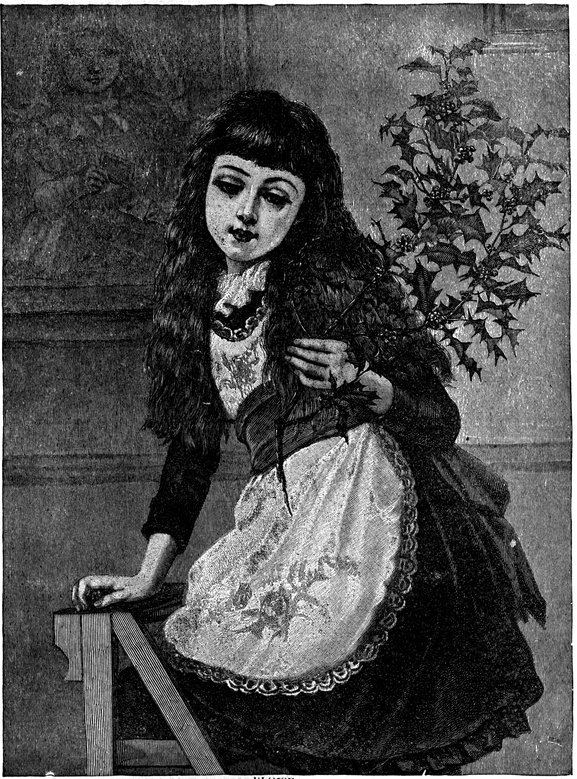
ELOISE.
“Eloise, I want the ladder!” shouted Carl.
Eloise laid her face against the picture and said, “Good night, little sister, I wish you could kiss me. You won’t forget to love me, will you?”
The picture seemed to smile sweeter than ever. Eloise climbed down the ladder, feeling that heaven could not be far away as dear little Floy seemed so near.
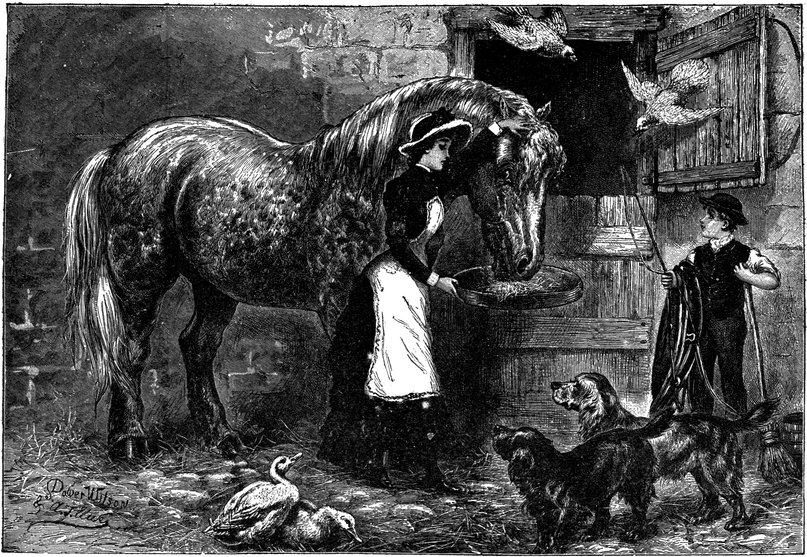
The master’s three dogs were privileged to come into the house. One day when they entered they knew at once there was something new in the house, though nobody said so, and nothing was seen. Dogs are very wise about some things.
These dogs were sure they were right, and they meant to prove it by finding this new thing. They smelled of the chairs and the floor, and trotted about through the house. In less time than could you or I, they found the door that led to the room that contained the box that held the new thing they were in search of. They pushed open the door; they walked in; they looked at the box; they wagged their tails. By their manner, one knew they were thinking, “I told you so! Our noses are better than some people’s brains.”
The box was large; the cover was off. Nothing could be seen except a lot of paper, but they knew there was something there besides paper. They smelled of the paper, they smelled of the box. The odor excited their nerves. They could stand it no longer. They tore off the paper and threw it about.
One grew so excited he jumped in the box. His legs went round something, he couldn’t tell what. It seemed like a creature that he must drag out. He pulled with all his might, when up from the box there rose, like a ghost, the head of a fox. His eyes were wide open and so was his mouth, his ears stood straight and his tongue hung out. Such barking and jumping! Trip couldn’t let go, for then the fox at once dropped below.

And this was their plight when the master walked in. All were surprised. The master looked queer. Scold them he wouldn’t; in fact he felt proud. His dogs, without bidding, had “unearthed” the fox.
“Now, Pussy-diddle, you have eaten your dinner and it’s time you were taught how to spell. And Doggie-dibble, you have taken your recess, it is time you were taught how to read. Come, Pussy-diddle, spell ‘purr.’”
“Pur-r-r-r.”
“That isn’t the way to spell ‘purr;’ you have put in too many r’s. Try again.” “Pur-r-r, meow!”
“I didn’t ask you to spell ‘meow.’ Put down your paw and sit up straight. Now try once more to spell ‘purr.’”
“Pur-r!”
“That is right. Come here, Doggie-dibble, and sit by my side and look at this paper with me. Here’s a page of very fine ladies, and a page of beautiful birds. Oh, here is the lesson for you. Turn your head this way, Doggie-dibble, you surely can tell about this. You mustn’t read to yourself, Doggie-dibble, ’cause then I can’t tell when you are wrong. Now, sir read aloud.”
“Bow-wow!”
“He is a bow-wow, that is right. Go on.”
“Wow-wow!”
“Good dog! Now, Pussy-diddle, you have learned your lessons for to-day, and so have you, Doggie-dibble, and now you may both go to play.”


“We can’t stand it much longer.”
“That is so. We are pretty thin now.”
“I should say so. Look at my sides. You can see my ribs so plainly anybody would suppose I had buried all my old bones there, instead of in the ground.”
“I don’t suppose master means to starve us.”
“Probably not. But that thought does not fill the hole in my stomach. We’ve not had a square meal for three days.”
As Zip and Jerry were talking, the master came in to prepare his meal. He lived alone with his two dogs. He was a good master, but was inclined to be stingy, and was growing worse. Zip and Jerry lay close together to sympathize.
They watched the master put the bread and meat on the table. They saw him begin to eat. They could hardly stand it, they had such queer feelings about their ribs.
The master left the room a minute. Zip and Jerry looked into each other’s eyes, as much as to say, “We’ll have to do it.” They arose, walked to the table, and tried to help themselves. They did not get many mouthfuls, for the tablecloth slipped, and everything else came down with a crash and a crack. The master hurried back, and in great rage stamped his feet and clinched his fists.
Zip was so frightened he turned to run, but Jerry, with his tail between his legs, stood his ground. He raised his head and barked.
“What are you about you rascals?”
“Bow-wow!”
“Don’t you know any better than to do such a thing?”
“Bow-wow, bow-wow!”
“Crack my plates and make such a mess!”
“Bow-wow-wow, bow-wow-wow.”
“What do you mean by barking?”
Jerry whined and tried to wag his fallen tail. He tried to explain as well as he could in dog language. He wished to say, “You wouldn’t give us enough to eat, and we were so hungry we had to help ourselves.”
The master sat down to think. His dogs had never done such a thing before. Perhaps they were hungry. He remembered that he hadn’t over-fed them for some time, and that very day they had asked for food and he had forgotten to give it. Although he was still pretty angry about his broken dishes, he felt a little ashamed of himself. After that day, he gave his dogs better food, and enough of it.
This fine-looking boy is going home from his work. His mother is poor. He helps her by selling on the streets the buns that she makes. He calls to the passers-by that he has buns to sell, “Fresh buns! Fresh buns!”
He makes the most money at the railway stations. He goes to the trains and asks the passengers to buy. “Fresh buns! Fresh buns!” They like to buy of him, because he has such a pleasant face and manners, and is always so clean. He sells many more buns than he would if his hands or clothes, or baskets were soiled. He sells many more than he would if he looked cross and was crabbed.

You can see that his baskets are empty. He has sold every bun that he had; now he is taking home to his mother all the money he received for the buns. He is a great comfort to his mother. Every little boy can be that, but I am afraid there are some little boys who are not.
The doves are not afraid of Ursula. They know she loves them, for she feeds them every day, and is always kind.
Do you see that one at her feet? He is looking up into her face. He wishes to stand on her hand and eat from it; but one dove already covers her hand, and there is not room for another.
The dove that has just taken a drink from the water-lily bowl is looking at her too. He will hop on to her shoulder pretty soon. He knows she often has a little piece of bread in her mouth, and if he gives her a kiss—the kind doves give—he will find a bit of bread in his bill.
Sometimes a dove will fly to the top of Ursula’s head and peck at her hair. That is their way of giving love-pats. They stay near her as long as they can. When she leaves them, they fly to their dove-cots.
When they hear her voice in the garden, they fly to her, even if she does not call. And whenever she calls they always come. If Ursula were not kind and good to them, the doves would not love her.

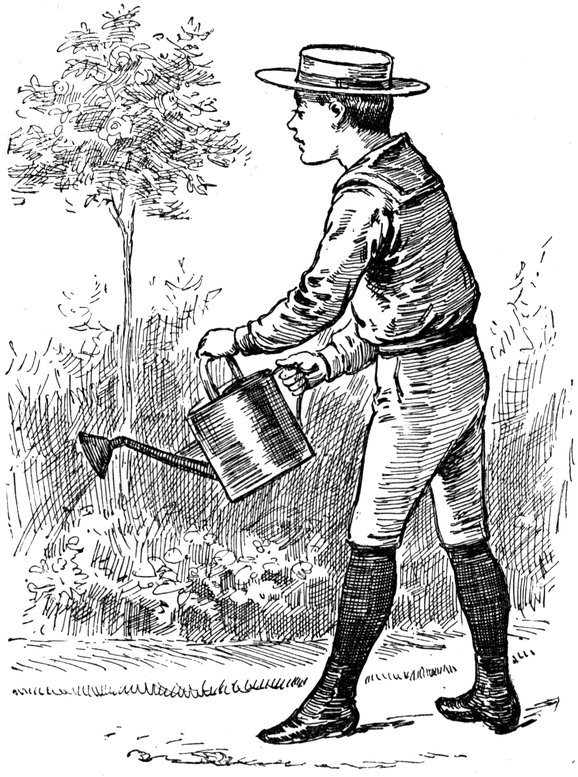
One day Eva was eating a nice ripe peach. She thought she would plant the stone in a flower-pot and see what would come of it. Fred filled the pot with nice soft earth, and Eva kept it in a warm place all winter. Once in a while she would dig up the stone to see how it looked, and one day she found the stone split in two and a root starting from it. Oh, how pleased she was! and how eagerly she watched for the first green shoot to push its way through the soil!
In a month or two the peach-tree had grown quite tall, and when warm weather came Fred told Eva he would set it out of doors, for there was not room for it in the flower-pot. It would never be a tree if it had not space to spread its roots.
Fred made a lovely place for it in the garden. He marked out a circle, and edged it with pretty conch shells. Then he took his trowel, and dug a deep hole in the centre of this plot in which he put Eva’s peach tree. Then he packed the earth around its roots, and raked the ground smoothly, and sprinkled it with water from his watering-pot.
Inside the conch-shells Fred will set out a row of plants, and do his best to make them and the peach-tree thrive.
Eva has promised that Fred shall have the first ripe peach that she finds on her tree, for he is good and kind to her, and she loves him very dearly. But she will have to wait some time yet, for the tree is too young to bear fruit.
“Ma-a-a-ow! Ma-a-ow!”
“What’s that?” asked Donna.
“Why it sounds very much like my little brother crying,” answered June.
“I wonder what’s the matter with him.”
“Ma-a-a-ow! Ma-a-a-ow!”
Both the girls ran fast, thinking he must be very much hurt from the noise he made. They soon found him, and did not have to ask what the matter was. His knees and one hand were covered with dirt.
“I fa-a-a-alled dow-ow-own!” cried Jamie.
“Don’t cry, Jamie dear,” said June as she put her arms around him.
“It’s too bad, but never mind,” said Donna as she kissed him.
“Ma-a-a-ow! ma-a-a-ow!”
The girls brushed off the dirt and wiped away the tears, but still he cried “Ma-a-a-ow.”
“I wouldn’t cry any more,” urged the girls, for they found that he wasn’t hurt. But he did cry more, and I’ll tell you why if you won’t tell. I think he was afraid that if he stopped crying, they would stop kissing and petting.


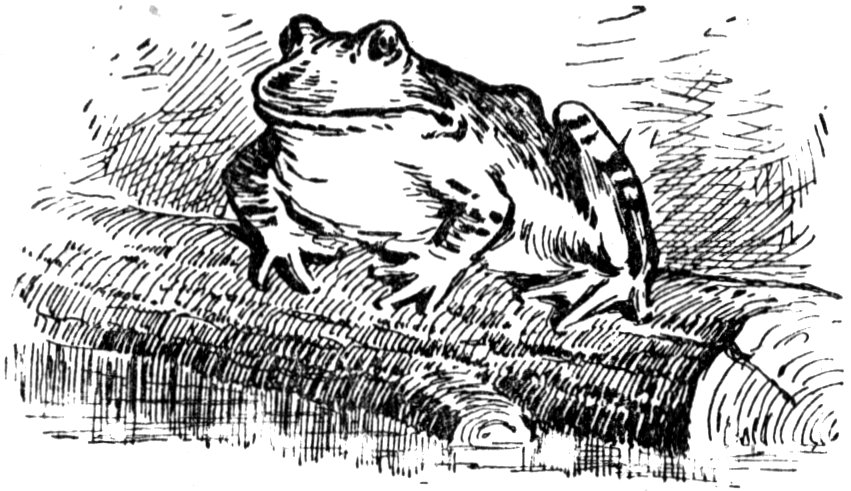
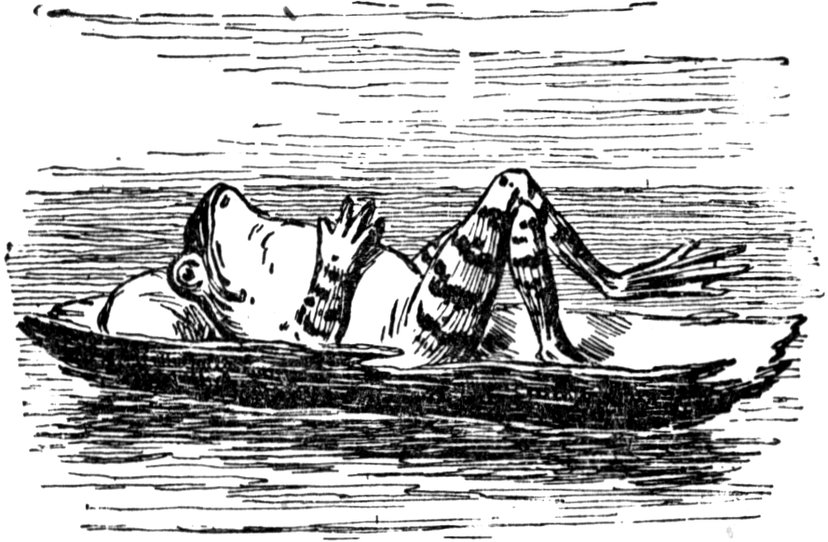
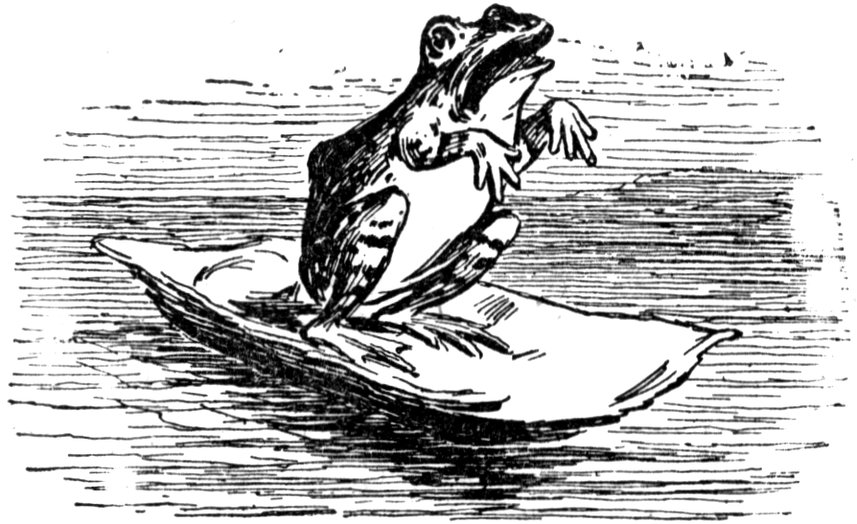
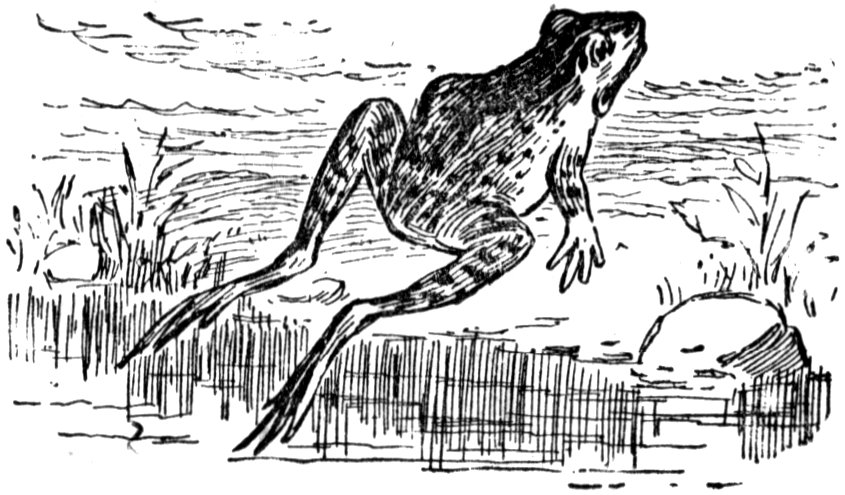
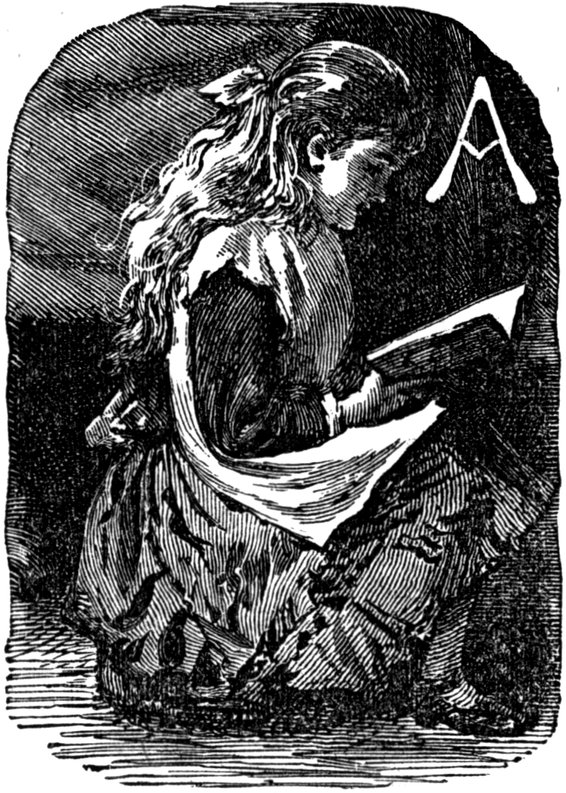
An old German woman came to stay at the mill, and she used to tell Patty and Susan about the children in Germany.
She said, “I knew a little girl called Lina, and a boy named Carl; and on Christmas Eve their mother had a fine Christmas-tree, with gold and silver balls, and sugar cherries, and all kinds of pretty things hanging on its branches. It was lighted up with a hundred tiny wax tapers, so that there was quite a blaze in the room; and on the table beside it were many presents for all the people in the house, and a great number of playthings for Carl and Lina.
“They were just the toys they wished for most. Carl had a donkey on wheels, and a whip, and Lina a doll, with a box of clothes, and also a set of tea things.
“They were very happy children, and never quarreled, but lent each other their toys. It was very pleasant to see them playing together, for they were so kind and obliging.
“Their mother had taught them a little verse, which she told them to say over every day; it was—
The old German woman had a picture of Carl and Lina, which she showed to Patty and Susan. In it was Lina with her doll, and Carl putting a basket on his donkey.
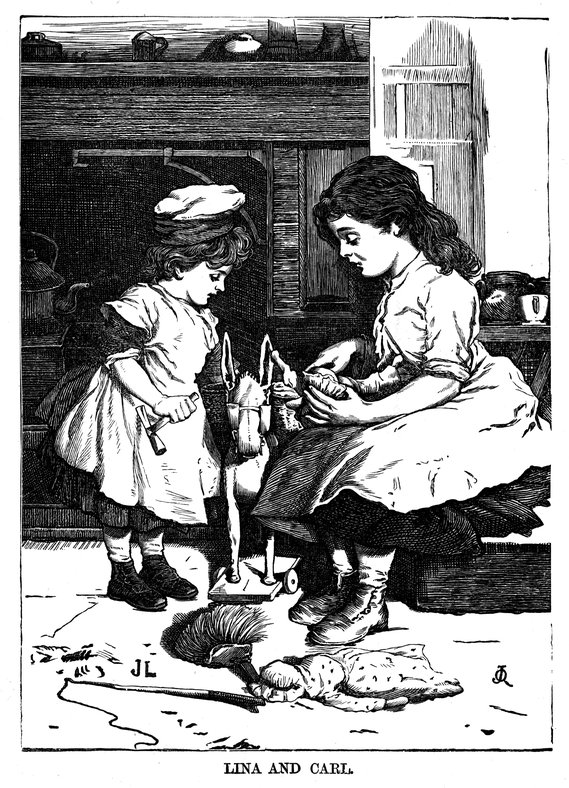
LINA AND CARL.

“O-o-h, o-o-h, my hand! my hand!”
“What is the matter, Bessie?”
“Grandmamma, Kitty has scratched me so dreadfully. Cross old thing, I hate her.”
“Fy, fy, Bessie. Only this morning I heard you say that you loved her better than anything in the world.”
“Yes, but she was good then. Just listen, grandmamma. I wanted Amanda Malvina to take a ride, so I just tied Kitty in front of her carriage for a horse, and what should she do, but kick Amanda out, and when I gave her a little tap, she clawed me.”
“But, my dear, didn’t you set the example by giving the first blow? Poor Kitty isn’t a Christian, you know.”
“Am I a Christian, grandmamma?”
“I hope so, little one. Have you forgotten the verse you said at prayers this morning, about forgiving your enemies, and those that ‘despitefully use you’?”
Bessie sat very still for five minutes.
“Grandmamma,” said she, “I think I’ll make up with Kitty.”
Half an hour after, grandmamma smiled as she saw through the open window a perfect picture of a happy family. Bessie, Amanda Malvina, and Kitty, swinging in the hammock together. War was ended. Peace declared.
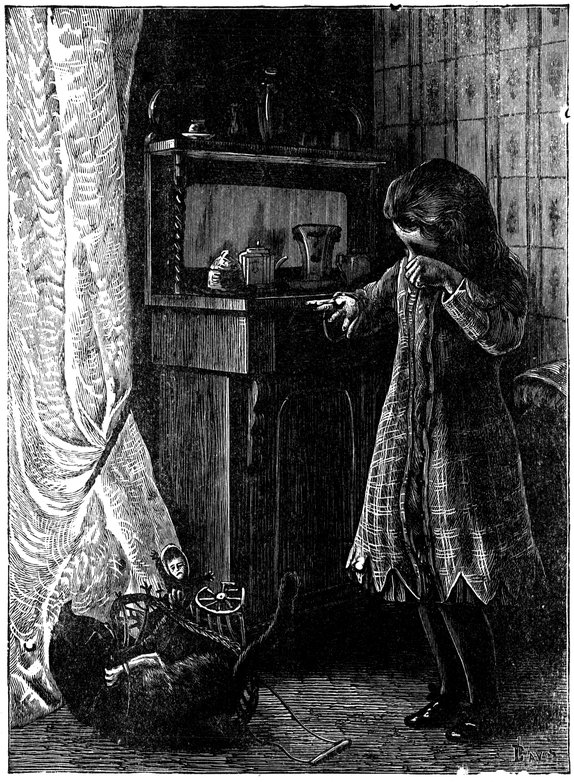
A TERRIBLE SCRATCHER.
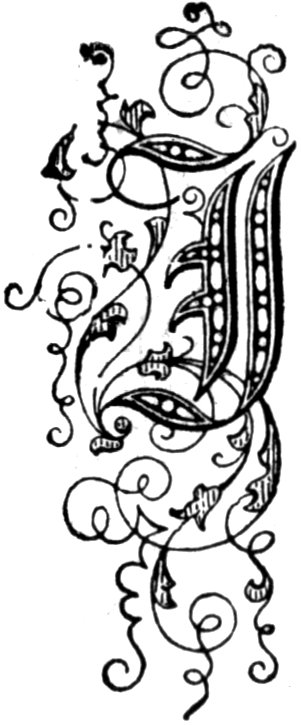
I must tell you about my cat Posy, and the sound drubbing she got the other day. Miss Posy had eaten a hearty breakfast, but, like a little glutton, wanted more. What should she do, but go into the garden and seat herself near a peach tree, in which there was a marten-box. The birds were busy feeding their little ones, and as long as they were about, Posy hid under a rose-bush, but soon the old birds flew away, and then was her chance. Looking around to see if anybody was on the watch, she crept up the tree.
Jumping on the top of the box, she put her paw into the hole to feel for a young bird. Suddenly there was the greatest chatter I ever heard—the old birds had come back and caught the thief. But they could not make pussy stir. Then the father bird flew to a big marten-box on the top of the stable, and in a few moments came back with all the other martens. They pounced upon Posy, and pecked her until she was glad to run down the tree and hide under my skirt.
I don’t think she will want a bird lunch again very soon. If she does, I think she will go without it rather than venture again to the martens’ home. But kitty only did what bad boys often do, who know the difference between right and wrong.

MISS POSY.

“Ted,” said Katie, from her little bed in the dimly lighted nursery, “this time to-morrow night, we’ll be at Poplar Grove.”
Ted and Katie did not reach their papa’s plantation until very late the following day, and were so tired from their journey that they went straight to bed. The next morning, they crept down stairs to see if their pony had grown any, and if Dash, the big Newfoundland, would know them.
After breakfast, Mrs. Barton let Ted and Katie go to see Dame Truman, a nice old woman who had taken care of Mrs. Barton when she was a baby. When they got to the cottage, they softly pushed open the door, and peeped in.
“Law, if it ain’t my blessed chicks, come to see their old Granny,” cried Dame Truman, hugging and kissing them.
“Now, my little dears,” said she, “I’ve got something pretty to show you.”
Taking up a pan of dough, she went to the door, and scattered some of it on the ground.
“Quack, quack, quack,” was heard, and up waddled an old duck with four young ones.
They looked just like balls of yellow worsted, and Katie wanted to take up one of the soft little things, only she felt afraid of the old mother. They were overjoyed when Dame Truman said that the little ducks were for them.
“I shall call mine Cowslip and Buttercup,” said Katie, “they are so yellow.”
“I’ll name mine Napoleon and Wellington,” answered Ted, “and I know they’ll be good fighters.”
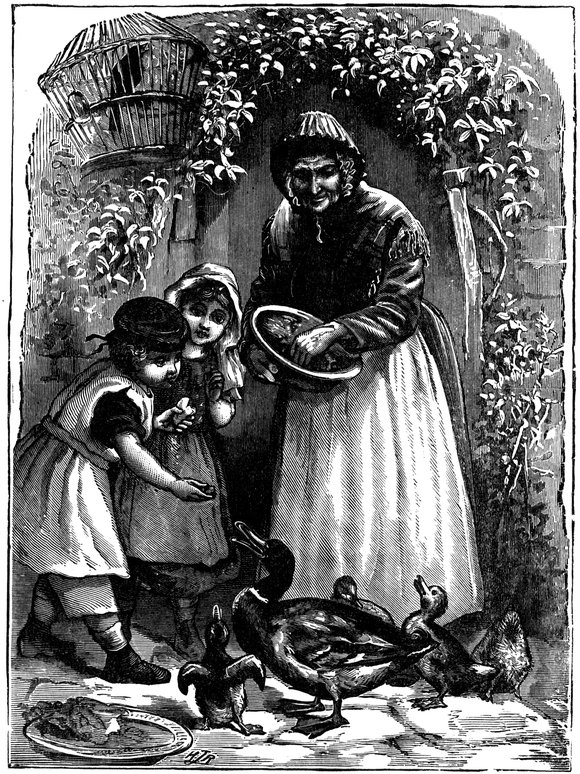
FEEDING THE DUCKS.
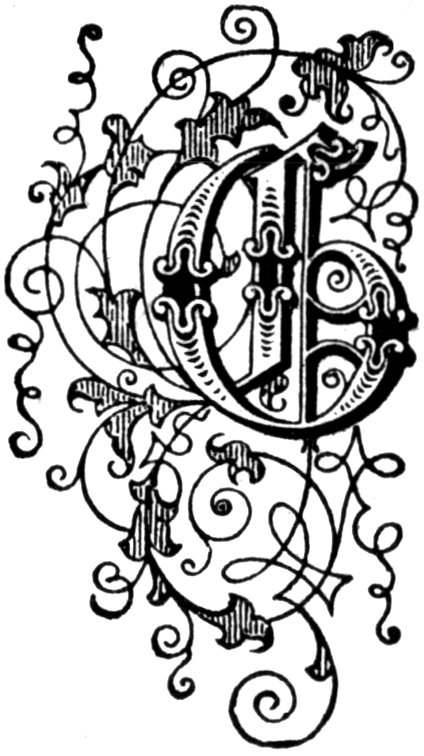
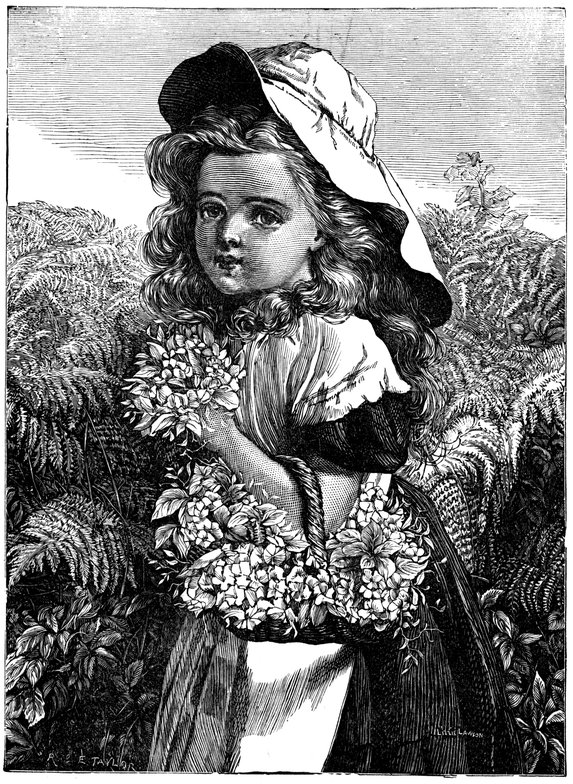
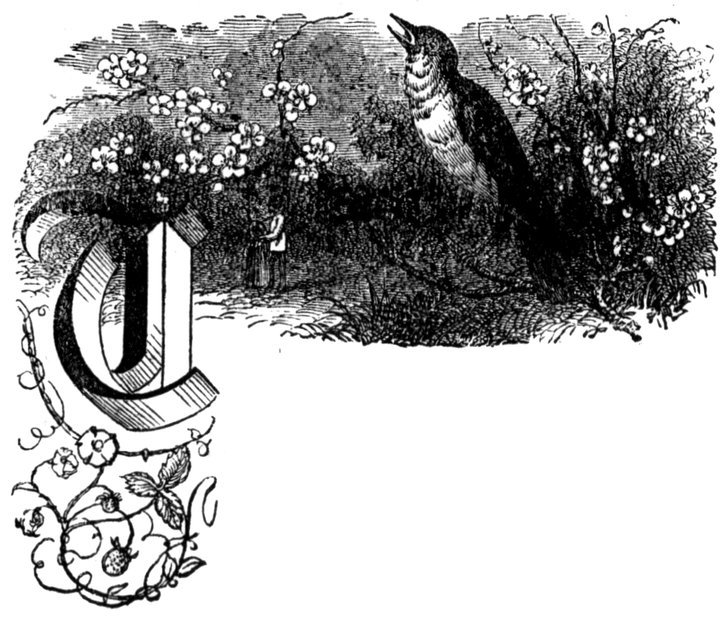
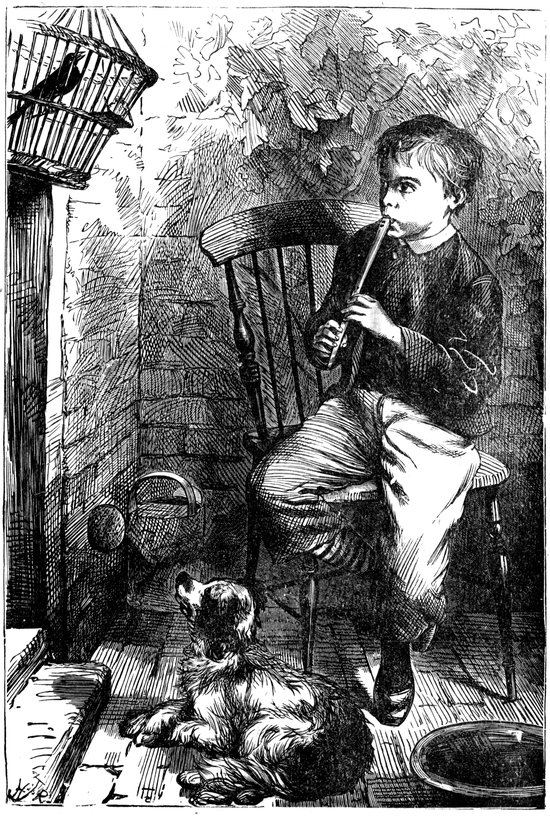
WHISTLING A TUNE.
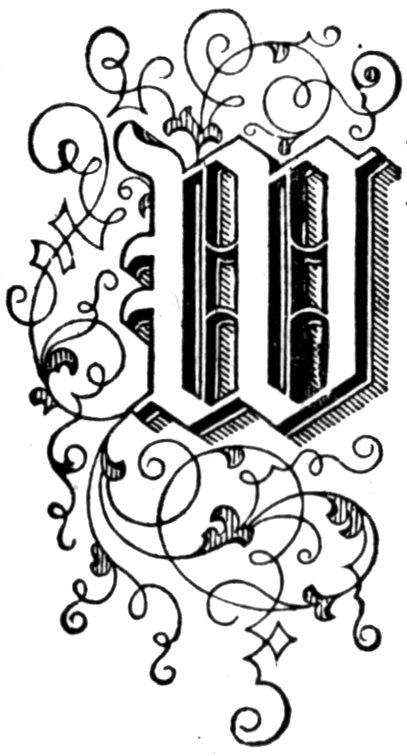
When Henry’s birthday came, he put a garland of red roses around Malcom’s neck. Malcom was a handsome brown fawn, with a white breast. He did not stay with the other deer in the park, but had a place fenced off for his own playground. Henry brought him sugar and sweet cakes, and he fed from his hand, and followed his little master around like a pet dog.
Henry lived in Scotland, and his father was the chief of the MacDonald clan. Upon his birthday, all the tenants, with their wives and children, came to the castle to dinner. Tables were spread in the great hall, loaded with good things. Henry, dressed in his Highland dress, stood by his father’s side, and listened to the speeches made in his honor. Afterward, there were games played in the park, cricket, wrestling matches, and shooting with the bow and arrow. Prizes were given to the boys who showed the most skill.
While Henry was watching the games, Malcom came and rubbed his nose against him, as if to say, “Don’t forget me.” But when the bagpipes began to play, he was frightened, and bounded off amongst the trees.
As soon as Malcom’s horns grow, he will be turned out with the herd of deer, but Henry will get the keeper to put a mark upon his pet, so that he may always know him.

MALCOM.
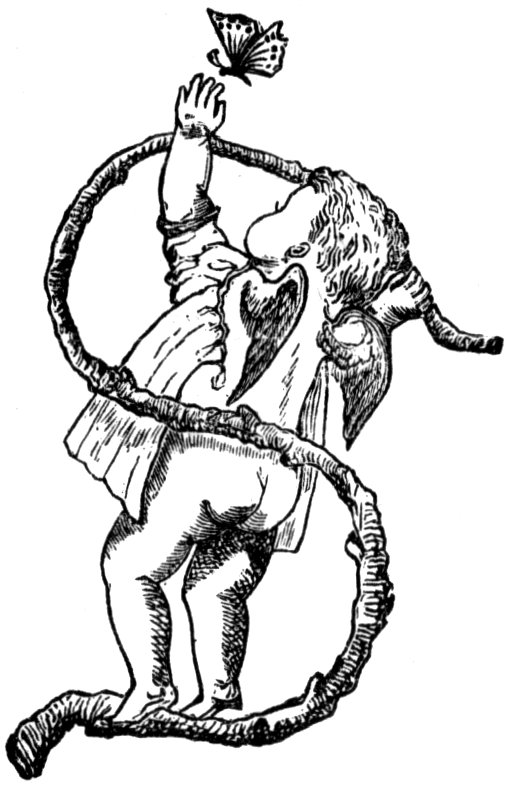
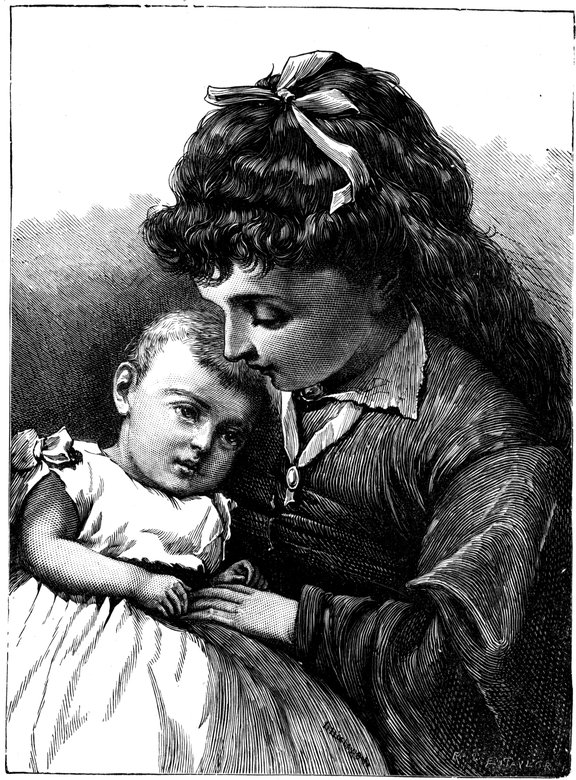
BABYLAND.
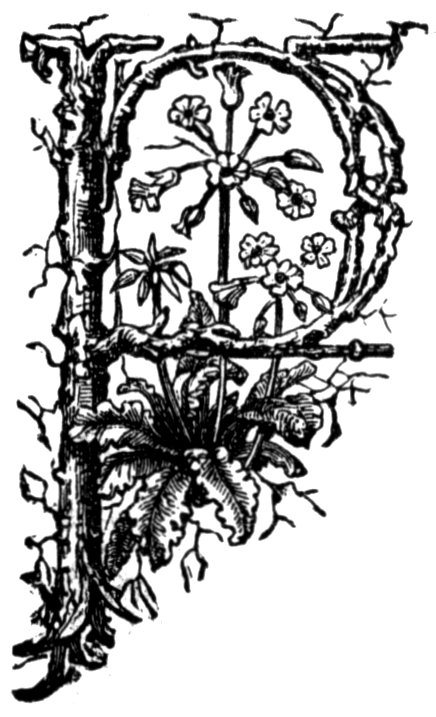
Peter would never take the trouble to learn the Multiplication Table. He always looked at the printed card when he did his sums, until his teacher caught him at it, and took the card away. Then he fell to making marks on his slate, and counting on his fingers, but it did no good. Poor Peter was kept in every day.
Look at him nearly tearing his hair out over five times seven. If he finds that hard, what will he do with eight times eight, which you know is a stumbling-block to all little folks?
It is recess, and he sits alone in the school-room. He hears through the open window the merry shouts of the boys. They are playing base ball, and he knows his side will be beaten without his help—for I am sorry to say, Peter plays games better than he does sums.
The tears roll down his cheeks, and he mutters, “I wish arithmetic had never been heard of.”
Take heart, Peter, and try again. Such great men as Macaulay and Sir Walter Scott did not like figures when they were little boys—yet see what perseverance did for them.

PETER KEPT IN.
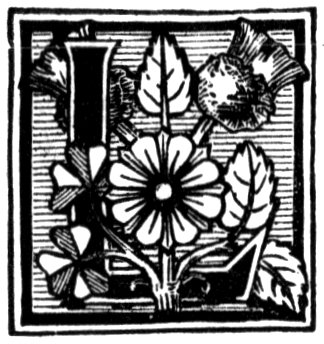
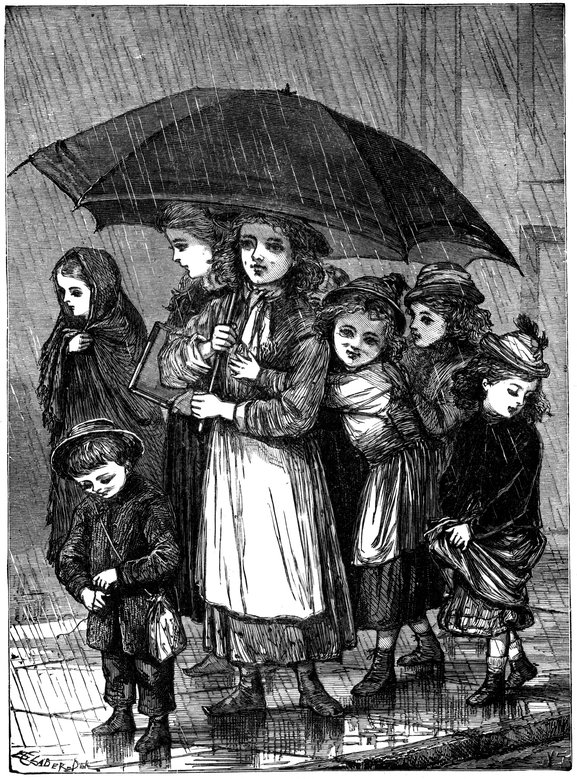
ONE DAY OUT.
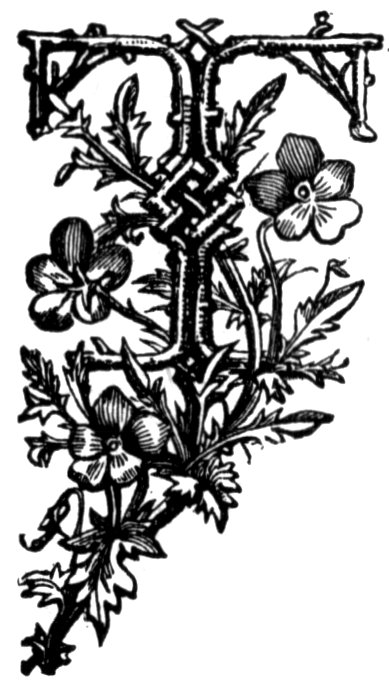
This funny little fluffy snowball comes from far-away Mexico, where, once upon a time, they used to eat dogs, nicely baked. They were considered “a dainty dish to set before a king;” but they were big, savage, voiceless brutes, not at all like the pretty mite I have drawn for you. He can make noise enough, and, if he were alive, would fly at you, and fancy that you were very frightened. I wonder why it is only small dogs that are noisy. Your big black fellow, with a head like a bear, gives a solemn deep-toned growl, but a mite that would go in your pocket can be heard all over the house. Well, after all, they are only like children, and like to make a disturbance, I suppose.
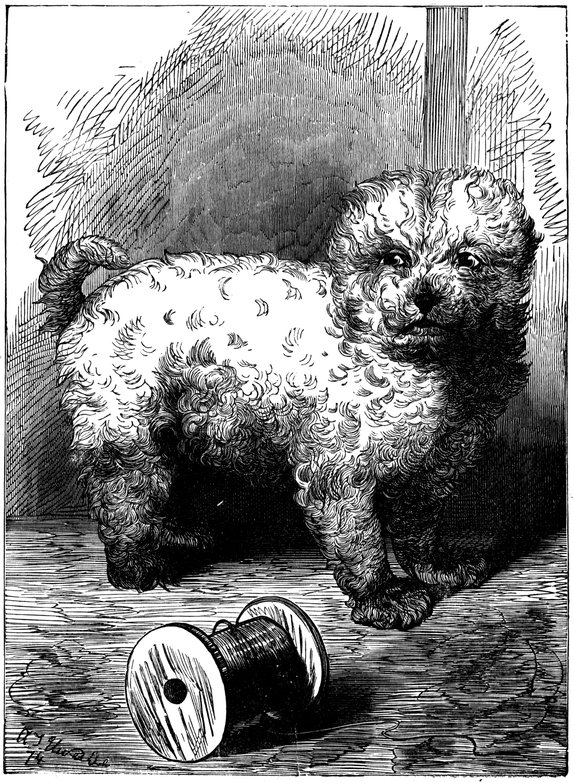
MEXICAN LAP-DOG.

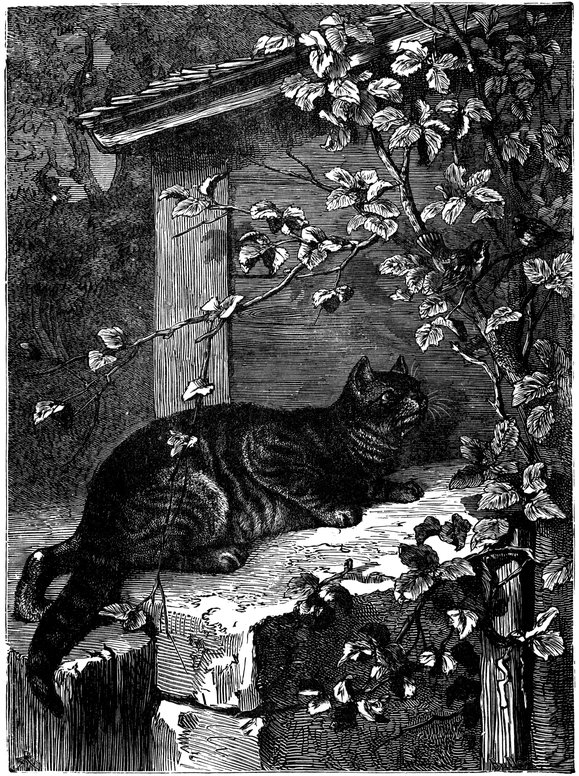
CRUEL PUSSY.
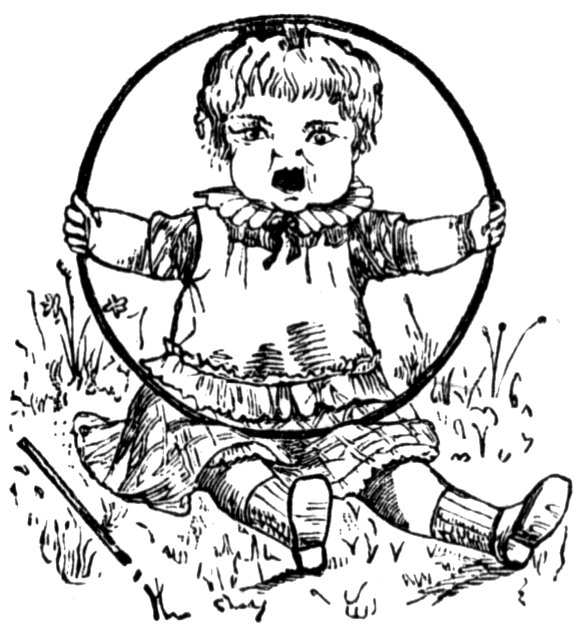
Over a hundred years ago, there lived a little girl, named Angelica Kauffman. She was very fond of drawing, and made pictures of everything she saw. Her father and mother were poor, but they were so anxious for her to become a great painter that they moved to Italy to live. Before she was grown, her mother died, and then she had to take care of her old father.
One day, when she was in Venice, a rich English lady gave her an order to paint a picture of her little girl. This made Angelica’s fortune, for the lady was so pleased with the young artist that she took her to London. Everybody there was very kind to her, and she became a famous painter. One of her best friends was Sir Joshua Reynolds, the great English artist.
She was so sweet and pretty that people called her “Miss Angel” instead of Angelica. When you are older you must read her life, for it makes a beautiful story.
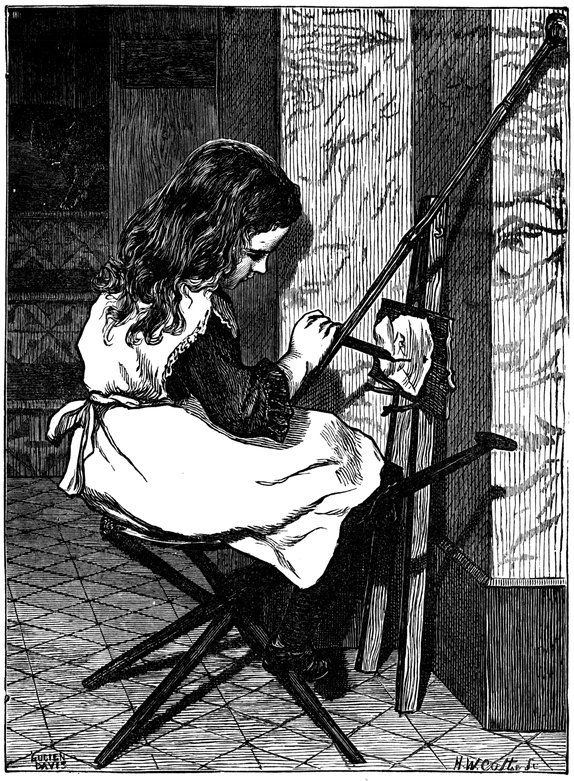
LITTLE ANGELICA.
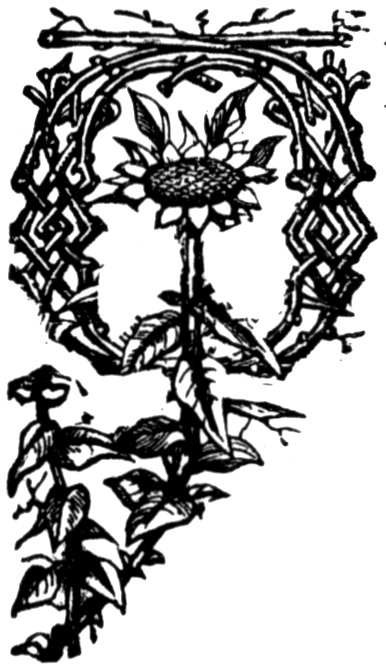
One morning Miss Kitty Greytoes took a walk in the garden. The sun was shining, the apple and cherry trees were in bloom, and the air was filled with the scent of pinks and lilacs. But Miss Greytoes did not notice these beautiful things. As she tripped along, she said to herself, “I wonder if that cat-bird has built his nest in the same place this spring. I dreamed about him last night, so I’ll go and see.”
Sure enough, when she came to the tree, there was the cat-bird sitting on a bent limb. Miss Kitty smacked her lips, and was just about to spring at him, when Whirr! whirr! sung a big beetle, and the cat-bird flew away.
“Good morning, Miss Greytoes,” said the beetle, bowing politely.
“None the better for seeing you, Mr. Beetle,” she replied; “some folks are forever in the way.”
“Heigho! Miss Kitty, you’re cross this morning. Didn’t your supper agree with you? I saw you through the pantry window, last night, stealing cream. It will do you good to fast to-day. Good-bye.” And away he flew to tell his friend, the cat-bird, the joke.
“Meddlesome old thing!” snapped Miss Greytoes, as she trotted off with her tail in the air.
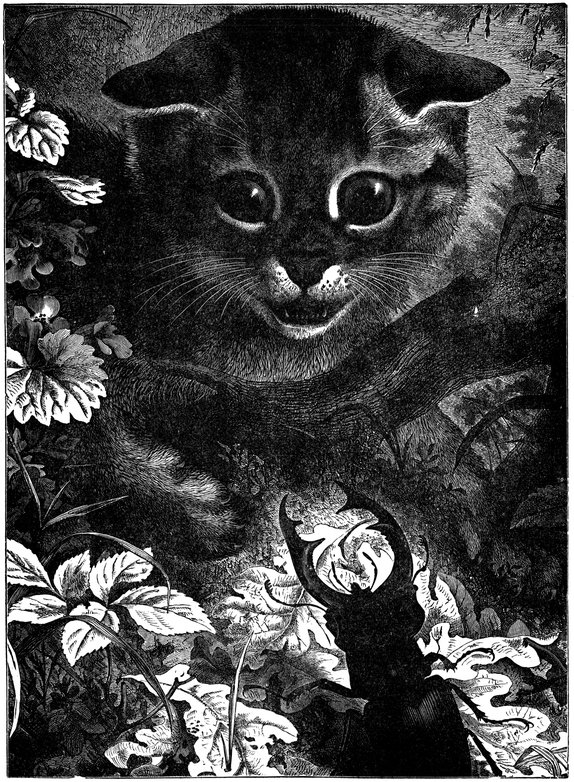
THE SURPRISE.
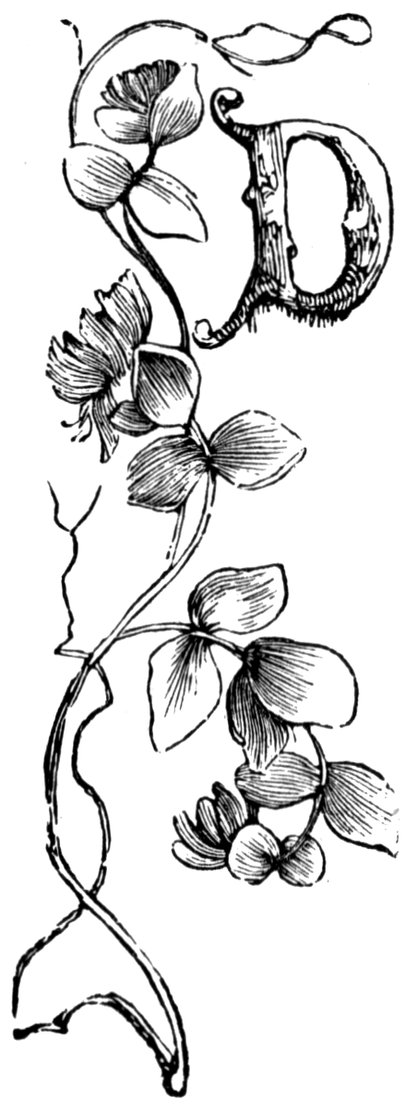

DICK DISAPPOINTED.

In Bologna, an Italian city, there lived an old musician who had a beautiful little boy. He taught him to sing, and play on the harp, but Guido loved drawing better than music, and instead of practicing, made pictures and little figures in clay.
His father thought this a waste of time, and gave him many whippings, but nothing could prevent the little fellow from drawing. When his paper was taken away, he marked on the walls, and after he had filled them, he drew pictures in the dust.
But Guido’s good luck came at last. His father gave a concert at the palace of a great lord, and Guido went with him. He met there a famous painter, who was so pleased when he saw the boy’s pictures, that he advised his father to let him be an artist.
To his great joy Guido was put in a studio, and studied so well, that when he was thirteen, his master made him teach the other scholars. As the years went by, he became a wonderful painter, and even kings paid the highest prices for his pictures.
The crowning glory of his whole life was his famous painting of Aurora, on the ceiling of a summer-house of a palace in Rome.
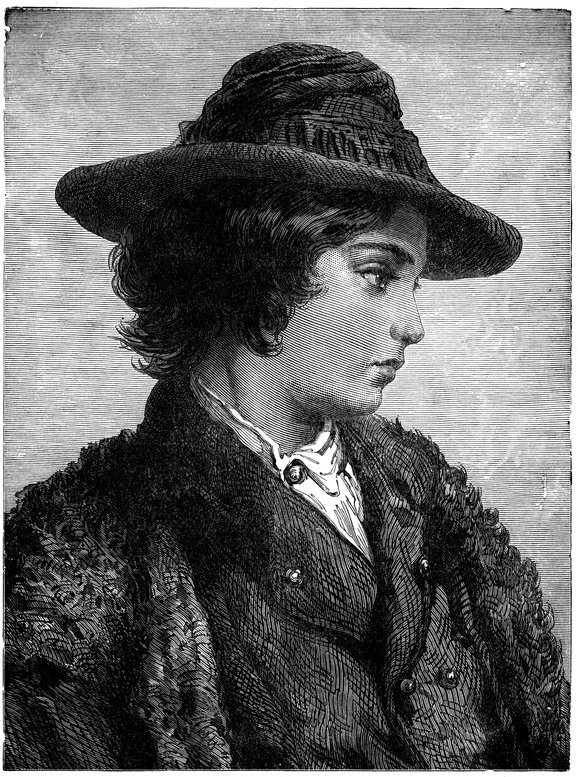
GUIDO RENI.

Maggie is carrying her father’s breakfast to him. She was in the middle of a pleasant dream this morning when her mother came to her little cot, and said, “Wake up, Maggie, it is almost five o’clock.”
“Dear me,” yawned Maggie, “what a bother!” And I fear she did not have a very cheerful face, as she trudged to the wheat field.
The air was sweet with the smell of clover, the dew-drops sparkled in the sunshine, and the birds were singing gayly.
“What is the matter?” said a dew-drop on a white rosebud?
“I’m so sleepy,” answered Maggie, “and it’s a hard case to have to get up at five o’clock in the morning.”
“For shame,” said the dew-drop, “I’ve been at work all night watering this flower, and presently, the sun will dry me up. If you had come half an hour later, we shouldn’t have met.”
“Lazy little girl,” cried a skylark, “I have been flying a mile high already, and had a nice air bath. Now, I’m going to hunt for my breakfast.” And away he flew, joyously warbling,
Maggie heeded the lesson of God’s little teachers, and met her father with a happy smile.
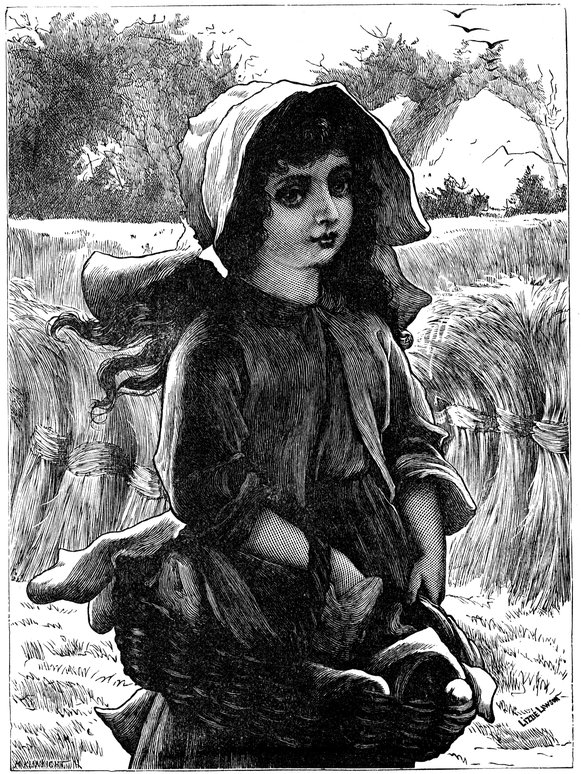
LAZY MAGGIE.
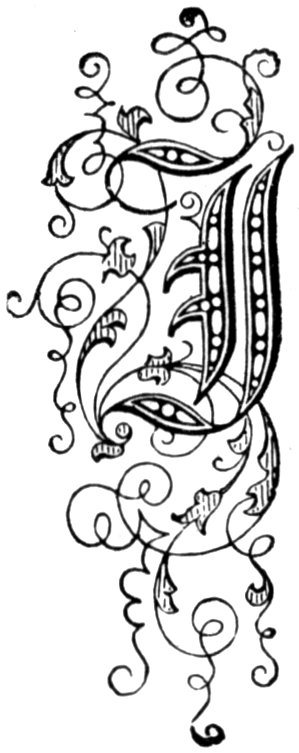
“Janet,” said Mrs. Bruce, “somebody is in the children’s cot at last.”
“I’m so glad, mamma. Who is it? A boy or girl?”
“A boy, and one whom you know—Frank Fenton. Yesterday his pony threw him, and broke his arm. I believe his leg was hurt also. It happened near the ‘Retreat,’ and he was carried there. When his father arrived, and found him so comfortable, he let him remain.”
“What good news! Think, mamma, of Frank Fenton lying in the bed that we little girls paid for. I wonder if he will like our picture screen.”
The “Retreat” was a private hospital, and Mrs. Bruce was one of the managers. Janet and her little friends had fitted up a cot in the children’s ward, from the proceeds of a fair, which they had held. Imagine their pleasure, when the first patient proved to be one of their companions.
As soon as Frank was better, Janet went to see him every day. She made an excellent little nurse, and the two had great fun over the screen, inventing stories to suit the pictures.
Janet now felt the sweet satisfaction of doing good. “Mamma,” said she, “when I hear the hymn, ‘A charge to keep I have,’ it reminds me of Frank. He’s my charge.”
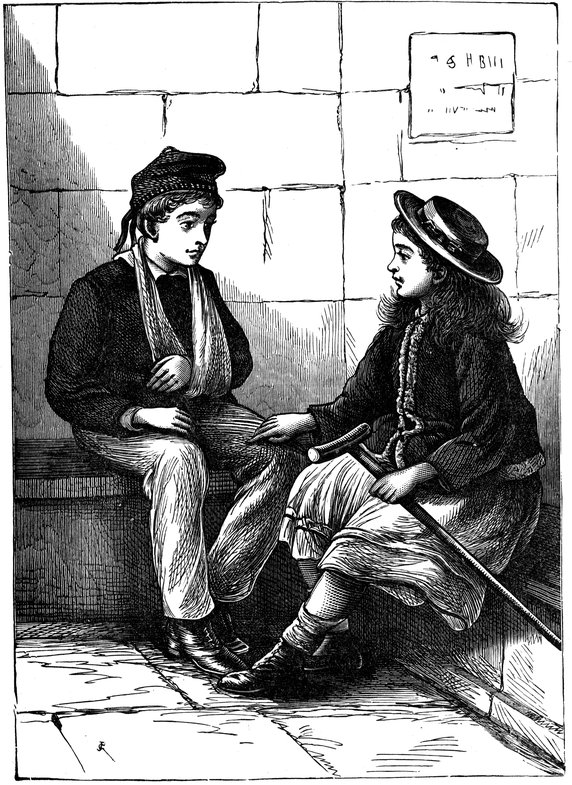
JANET AND FRANK.

Nurse was sick, so mamma had to take care of Baby Belle. They walked down the shady lane to meet papa, and Nipo, Baby Belle’s little dog, given her by her papa on her first birthday, trotted on behind. Baby had on the lace cap that Aunt Fanny had sent her all the way from New York, and looked sweet enough to eat.
“Putty fowers,” said she, spying the daisies and butter-cups.
“Does Baby want some for papa?” asked mamma.
“Ess, and butty-tups too.”
“Doggie, does oo love butter?” and Baby Belle put her fat hand, full of butter-cups, under Nipo’s nose. Nipo was a good-natured little dog and loved Baby, so he wagged his tail to say, “Yes.” Then he gave a joyful bark, and ran off.
“Papa is coming,” said mamma; “now for a ride,” and she and Baby followed Nipo.
At the stile Baby Belle got a dozen kisses from papa, who was on the lookout for his little daughter, and rode home on papa’s shoulder as proud as a queen.
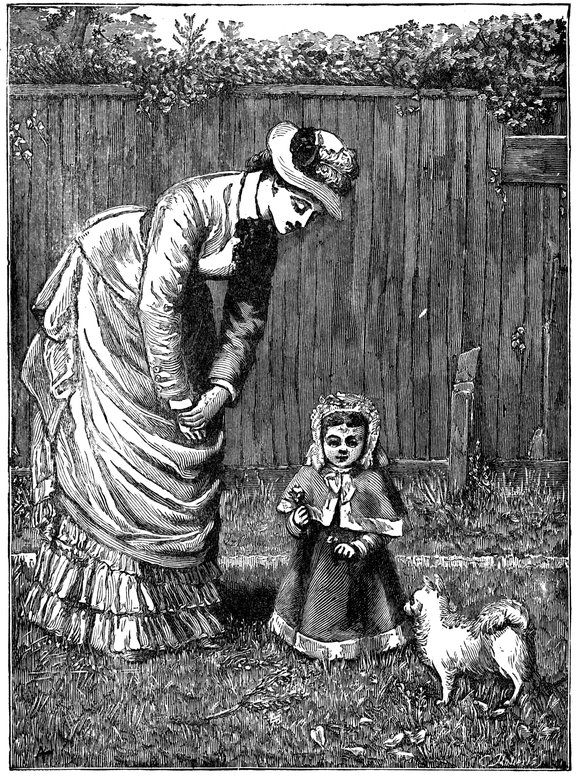
GOING TO MEET PAPA.
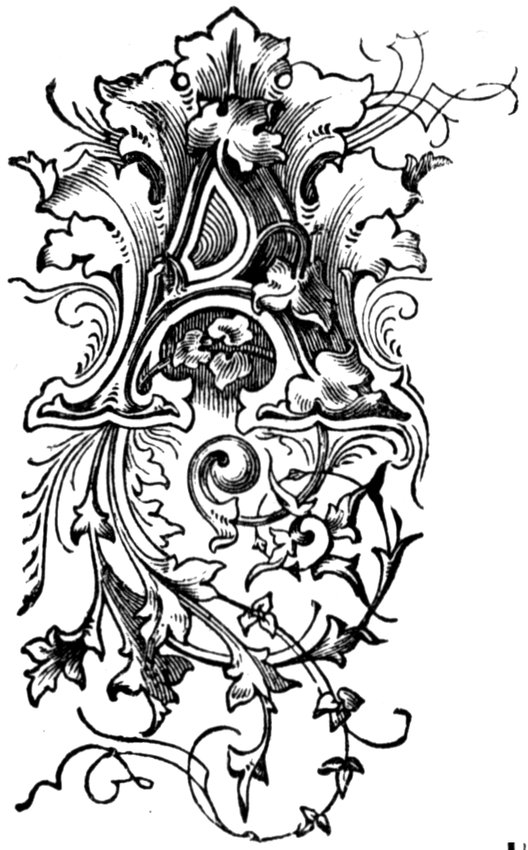
Annie had been to lunch with her little friend, Katie Heath. All the dolls were invited, and a merry time they had. It being summer, the table was spread in the arbor. Katie’s uncle brought her last Christmas from Japan a beautiful set of dolls’ china. This was arranged on a white cloth, and the tea tasted very good out of the pretty little tea-pot. There was also a sponge cake, which Katie had made with her own hands, for her mamma wished her to be a good housekeeper. After tea and sandwiches, they had strawberries and cream, to eat with the cake. The dolls sat at the table, and enjoyed themselves very much—only Mr. Punchinello, who is such a tease, would make fun of dear little Polly Primrose’s old-fashioned bonnet. She was used to his nonsense, and would not have cared, except that Marie de Montfort, Katie’s new doll, had on her Paris finery.
Polly looks very sad on her way home, but I think it is because Mr. Eugene Montmorenci is going to marry Mademoiselle Marie. It was all arranged after lunch, and the wedding is to be next Tuesday, Annie’s birthday.
Cheer up, dear Polly, something very nice is in store for you too.

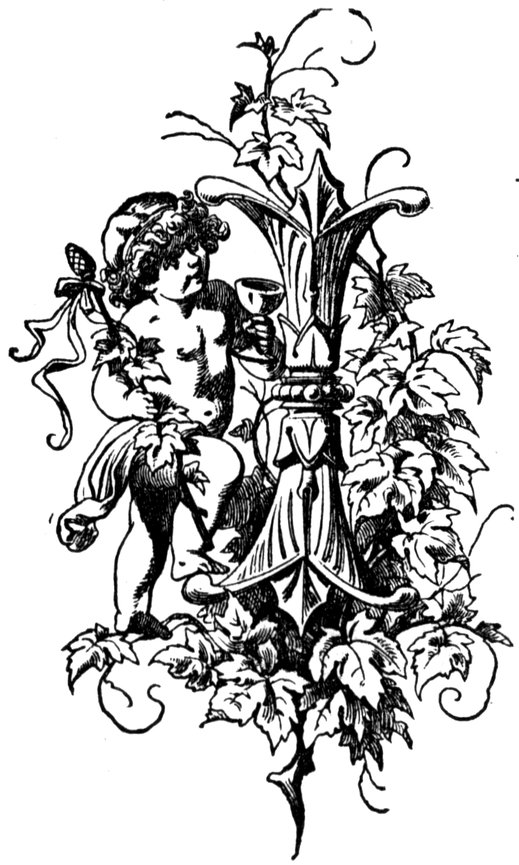
I am glad my mistress is out, that I may have the mirror all to myself.
Well, I am a beauty! though that spiteful cat next door says my face is streaked. She calls me “Miss Vanity,” but my good looks got me this nice home, with plenty to eat, and nothing to do.
This is the way it came about. My mother belonged to a little French boy named Henri, and being a French cat, she was very clever. One day when I was a tiny baby, a lady from New York came to stay at the house. My mother lay on the rug listening to the conversation, but pretending to be asleep. Henri said to the lady, “My cat has kittens, and one of them is beautiful.”
“Ah,” said she, “I wish I could see it.”
Upon hearing this, my mother trotted down stairs, and brought me up in her mouth. My, what a shout there was when we appeared! The lady said she must have the kitten of so wise a cat, and that I was perfectly lovely.
She promised Henri to be very good to me, so I was put in a basket, and brought to New York, where I am much admired, and happy as the day is long.
The last thing my mother said to me was, “Beauty is as beauty does.” I wonder what she meant?

VAIN MINETTE.
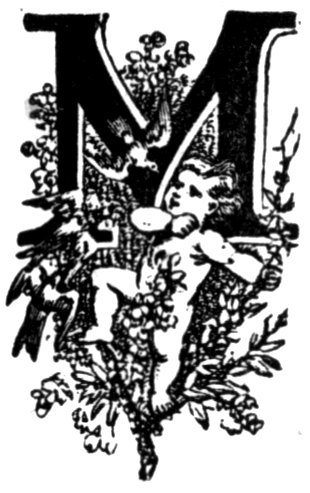
Marie was a little Southern girl, and had never seen a snow-storm. When she was ten years old, she spent a winter at the North with her cousins.
One morning she awoke, and looking out of the window, saw something soft and white falling.
“Cousin Caroline, run here,” she said; “they must be picking cotton up in heaven.”
Her cousin told her that it was snow, and in the afternoon she should go sleighing. I am sure that Marie will never forget her first sleigh ride.
But more fun was coming. When the ice became firm, Caroline and her brothers went to the Park to skate. Marie did not know how to skate, but Harold said she must have a slide on the ice, and that he would take good care of her. So Marie was tucked snugly into a sled, with plenty of robes to keep her warm.
Edmund played horse and pulled, while Harold did the pushing.
shouted Harold, and away they went like the wind.
Caroline, and Bébé, Marie’s dog, tried to keep pace with them, but were soon left far behind.
Was not Marie lucky to have such kind cousins?

MARIE’S FIRST SLIDE.
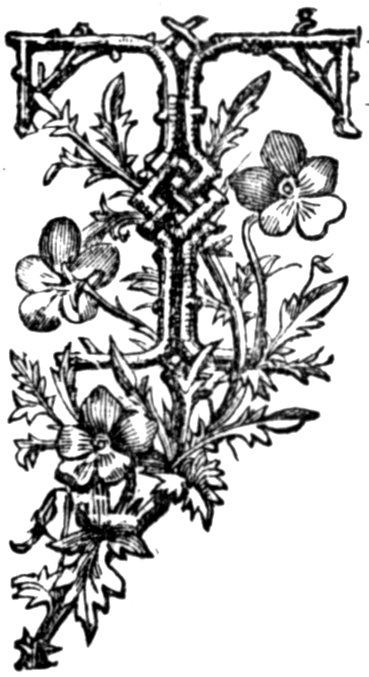
This Laplander looks as if he were sitting for his photograph, though I don’t expect photographers ever go to such a cold country as his. Lapland, you know, is in the northern part of Russia, and the people there dress in furs and skins all the time.
To go swiftly over the snow, they wear big shoes like the one the man is holding. These are strapped on the feet, and a Lapland boy skims along faster than any of you can skate.
But think of it—he never tasted a peach or a strawberry in his life. In his cold home only a few small trees and bushes grow. There are no fruits or vegetables, and the only food is the flesh of the reindeer, and fish.
The houses are round huts, with a hole at the top to let the smoke out.
The Laplander’s fortune is in his reindeer, and his only business, the care of large herds of them. A little Lapland baby lies in a cradle made of wood hollowed out and filled with white moss. Pieces of leather are laced across the top, and the mother fastens the cradle to her back when she travels.
Lazy little people who don’t like school, should go to Lapland, for there, if a boy knows his A, B, C, he is thought very learned.

THE LAPLANDER.
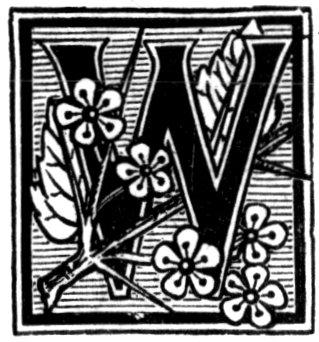
“What shall we do to-morrow, Charlie?”
“Suppose we go to the grove and gather flowers.”
“Yes, we’ll get some for mamma, and then she will tell us fairy tales about them.”
The next morning Charlie and Anna spent in the woods. Charlie pulled the flowers that Anna could not reach, and she carried home a big bunch, which her mamma put in a vase. There were dandelions, cowslips, jonquils, and woodbine.
“Does dandelion mean that the lion is a dandy, mamma?” asked Anna.
“No, dear, that comes from a French word—dent-de-lion—lion’s teeth. Another flower from the French is the pansy, which means pensée, thought, and the emblem is, Think of me.”
“Can you tell us anything about the jonquil?” asked Charlie.
“That flower belongs to the Narcissus family. There is a pretty story about it. Once there lived a beautiful boy named Narcissus. While hunting one day, he sat down by a stream to rest, and seeing his face in the water, fell in love with it. Because he couldn’t get his picture, he pined away, and the fairies changed him into a flower.”
“He was a silly fellow,” said Charlie.
“But if he hadn’t been so,” replied Anna, “there wouldn’t be any nice story. I love flowers with stories to them.”
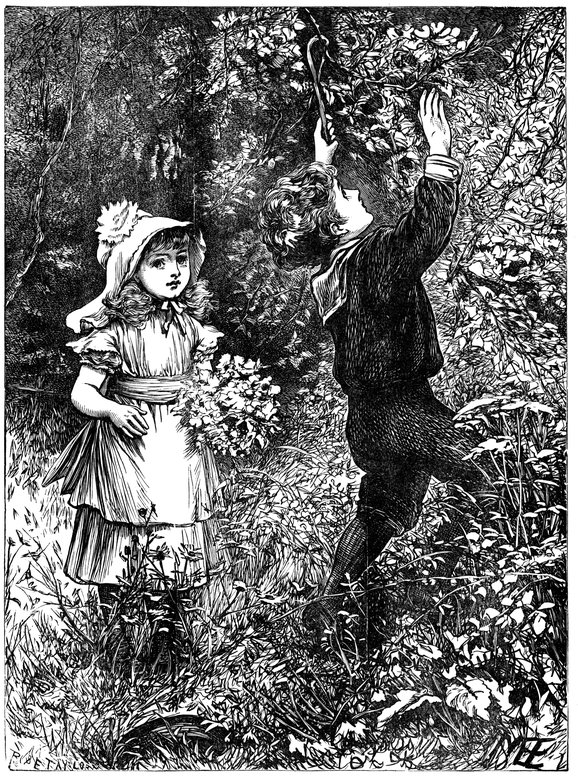
ANNA’S BOUQUET.

My boy Charlie has made a cork boat, and is blowing it about to try and make it sink, but it is like a life-boat, and will not go over. Did you ever see a life-boat? and do you know what makes it different from other boats? or why it is so called? Perhaps you don’t know, so I will tell you, for all knowledge is pleasant and useful.
A life-boat is so called because it is useful in saving life. When a ship is in distress, a life-boat can put off from the shore and reach the ship, and then come back again laden with the poor people it has saved from drowning, because it can live in a sea where any other boat would sink and be lost.
“Why is this?” you ask. That is just what I am going to explain. So, stop blowing, Charlie, and come and listen to me.
A life-boat is lined with cork; in other words, it has a compartment or inside casing filled in with cork, or sometimes with large thin metal air-tight tubes; this is done to make it buoyant, that is, able to keep bounding along the stormy sea instead of sinking to the bottom. For cork will not sink. Stick a sail to it, and blow as Charlie has done, but you will not blow it over easily.
The brave men who man the life-boat must be made safe, too; so they wear cork jackets, and life-belts filled with cork, and take life-buoys with them. A life-buoy is a large round casing filled with cork, with a hole in the middle large enough to slip over a man’s head and shoulders, and it will keep him from sinking to have one on.
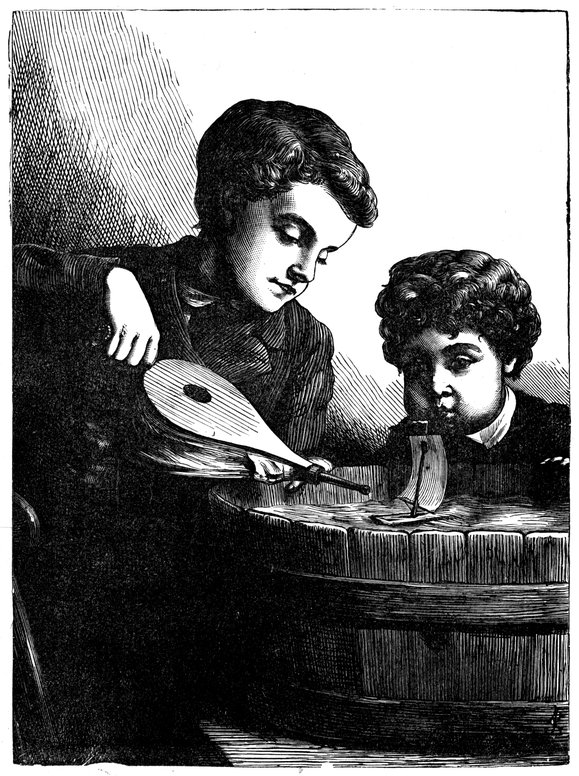
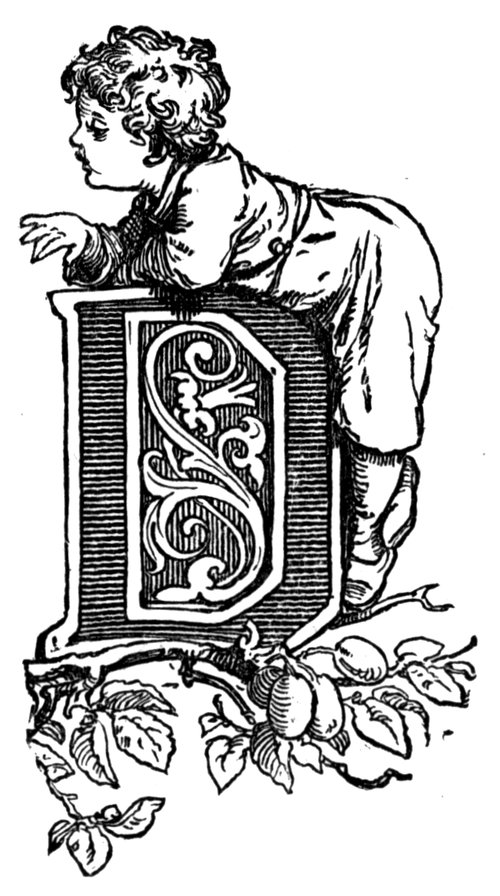
“Don’t be afraid, little girl—it is only Old Molly Hare. I won’t hurt you.”
“Oh, Molly, my heart is going pit-a-pat. I was playing that I was in a jungle, and when you popped your head up, I thought you were a lion. Where did you come from?”
“I was sitting behind the fence, and a bad boy threw a stone at me, so I took to my heels through the wheat. My little ones are waiting for me in the hollow tree yonder.”
“Tell me about them. Have they got pretty eyes, and long brown ears like you, Molly? I never saw a baby hare.”
“Their eyes are not as pretty as yours, little girl, but they can see behind and before at once, and their long ears can hear a pin fall.”
“How nice! I wish I was a hare, Molly.”
“Better be a little girl. You have a warm house, but we live under the rocks and fences—and when the snow is on the ground, if we even poke our noses out, the men and dogs are after us.”
“Well, I’m going to tell my papa that he mustn’t shoot you. But, Molly, don’t you get mad sometimes? I heard my grandpapa tell a man that he was as ‘mad as a March hare.’”
“That’s only an old saying, my dear. Hark! I hear a gun. Good-bye.”

OLD MOLLY HARE.

Nurse and George were standing by the garden gate one fine summer afternoon. George had been playing in the hay field, making nests in the sweet hay for himself and nurse.
And they had tossed the hay about, and thrown it at each other, and had had a good game of play.
And now nurse and George were both tired, and they were going into the house to have some tea.
Just then, Tom, the carter, passed by, leading one of the horses, and he said—
“Will you have a ride, Master Georgey?”
“I think not,” said nurse. “He has never been on a horse.”
“He will be quite safe,” said Tom; “Dapple is very steady, and if Master Georgey will hold tight by the halter, there is no fear of his tumbling off.”
“Oh, do let me go!” said George.
When nurse saw how quiet Dapple was, she let Tom lift Georgey on his back. Tom stroked the horse’s nose, and said—
“You will be glad of a rest in the stable, and of your supper.”
“What does he have for supper, Tom?” asked Georgey.
“Hay, and some oats,” said Tom.
“And what does he drink?”
“Fresh clear water,” said Tom; “horses like to have clean water to drink.”
“When I am big,” said George, “I will have a horse of my own, and I will ride on him every day.”
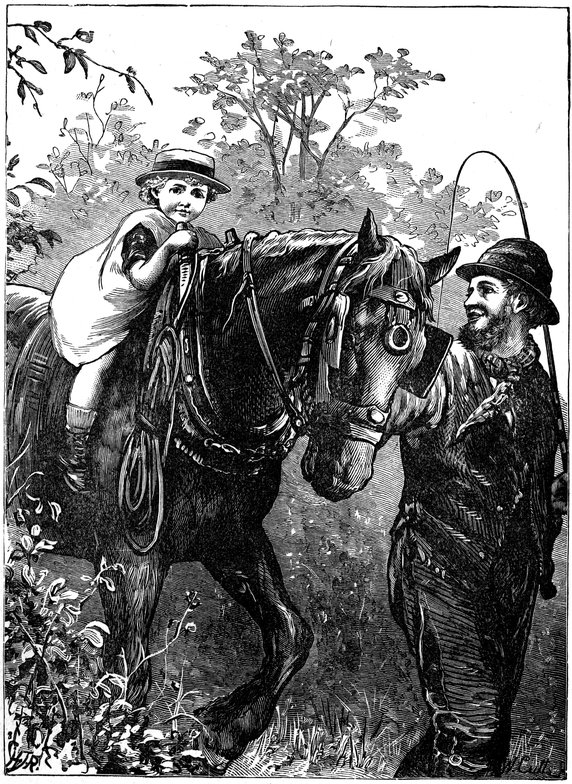
GEORGEY’S FIRST RIDE.